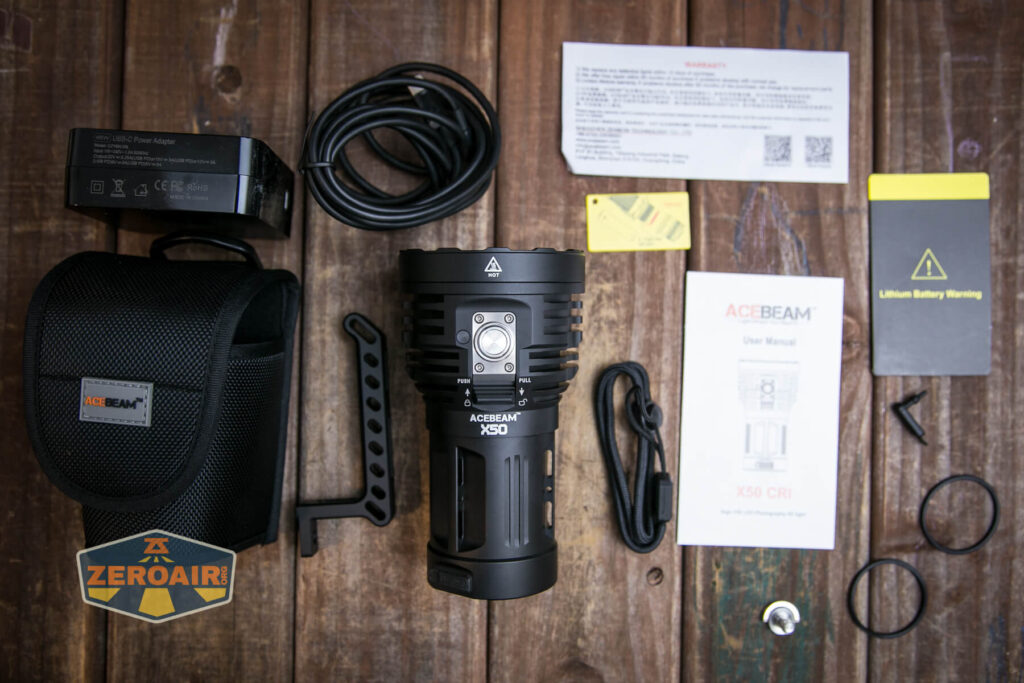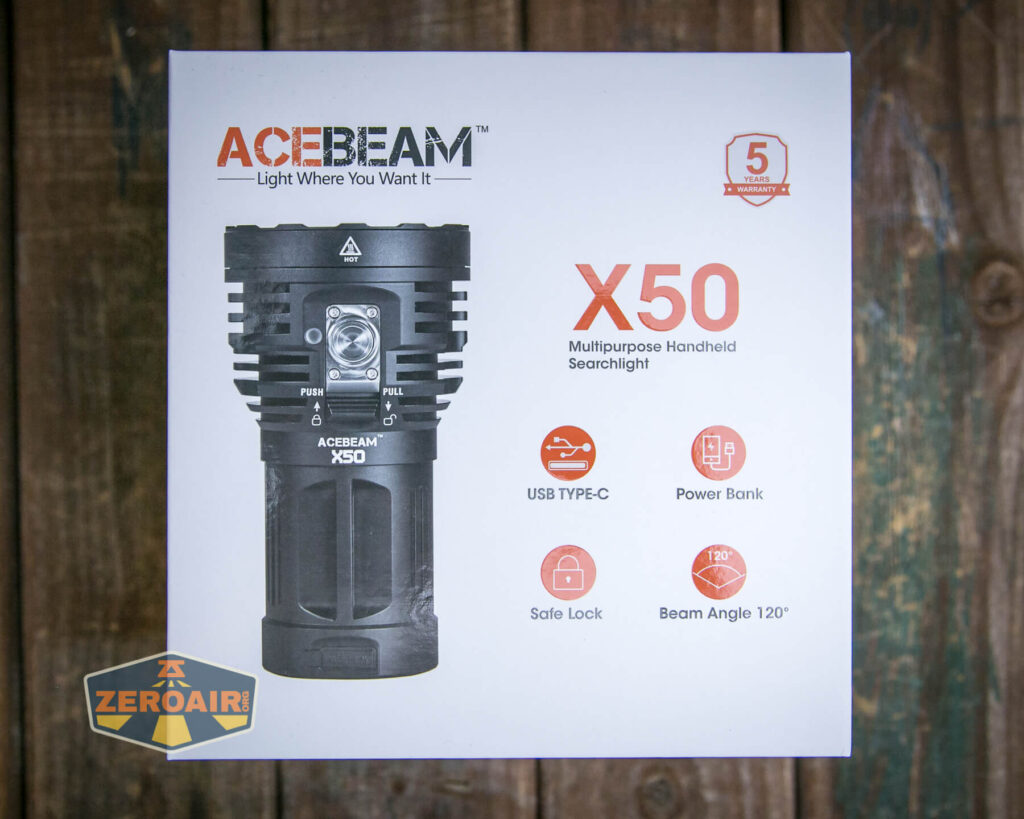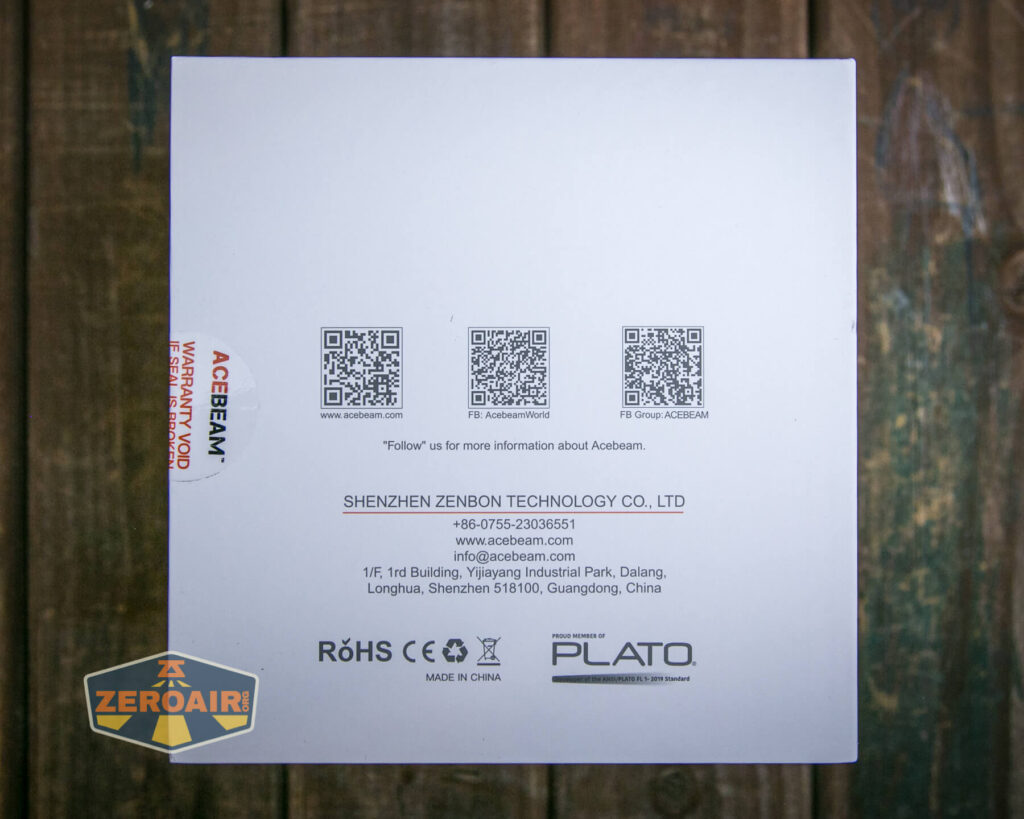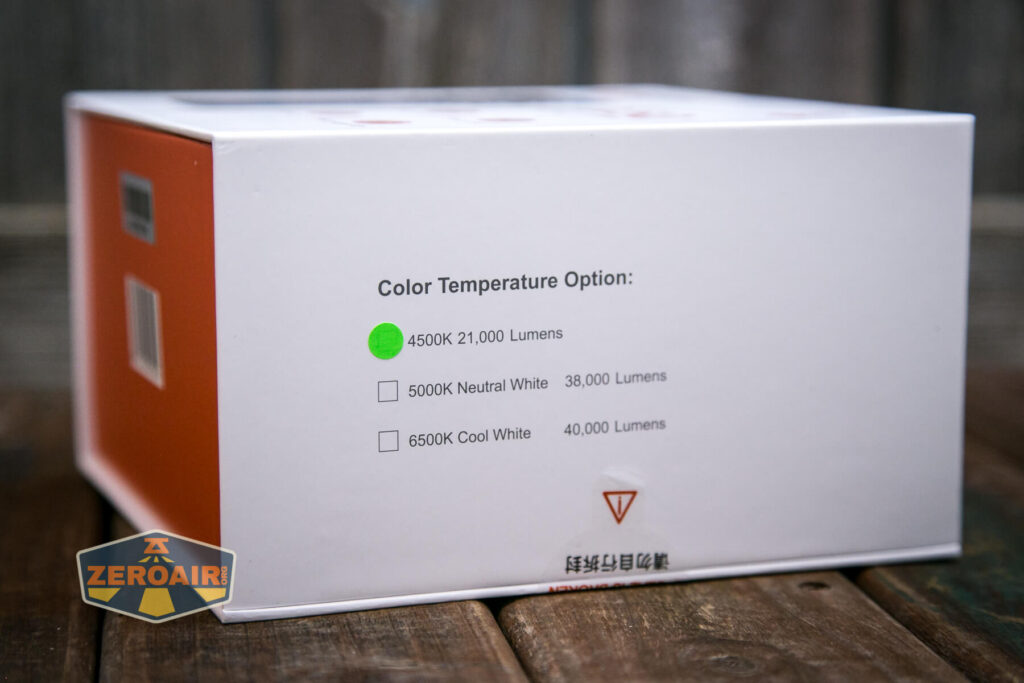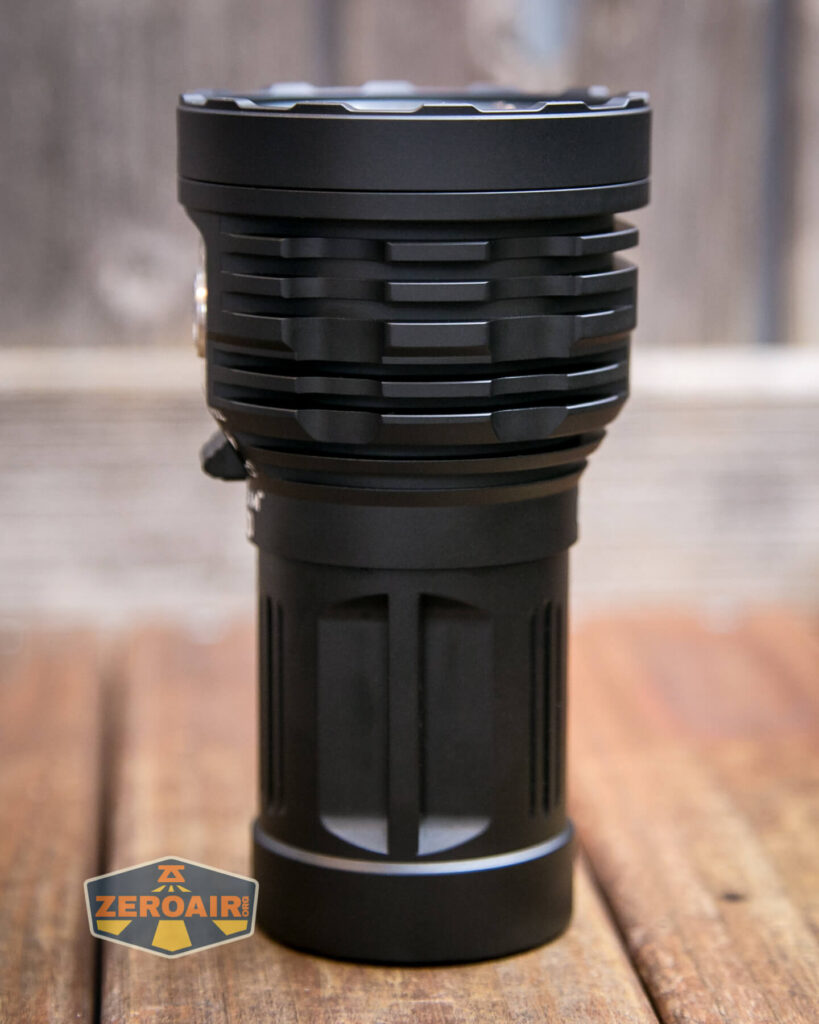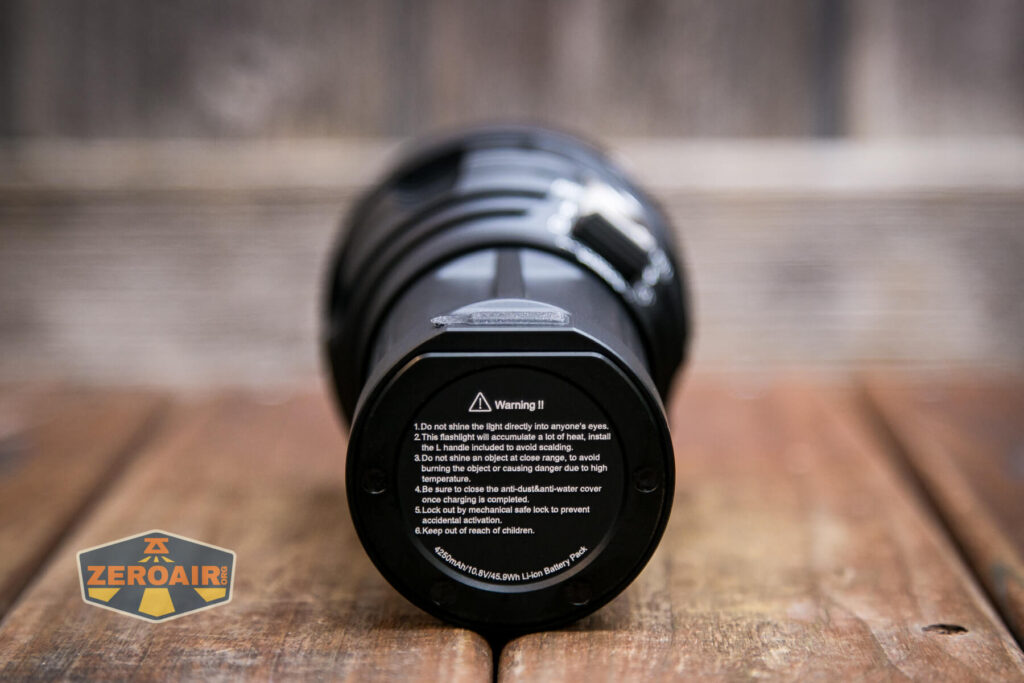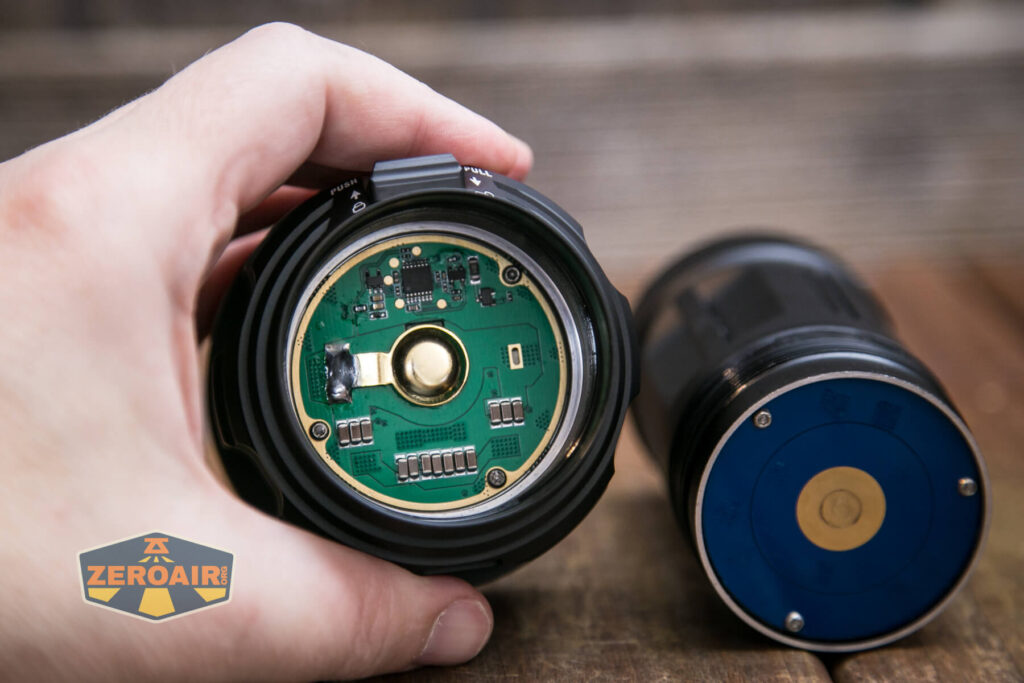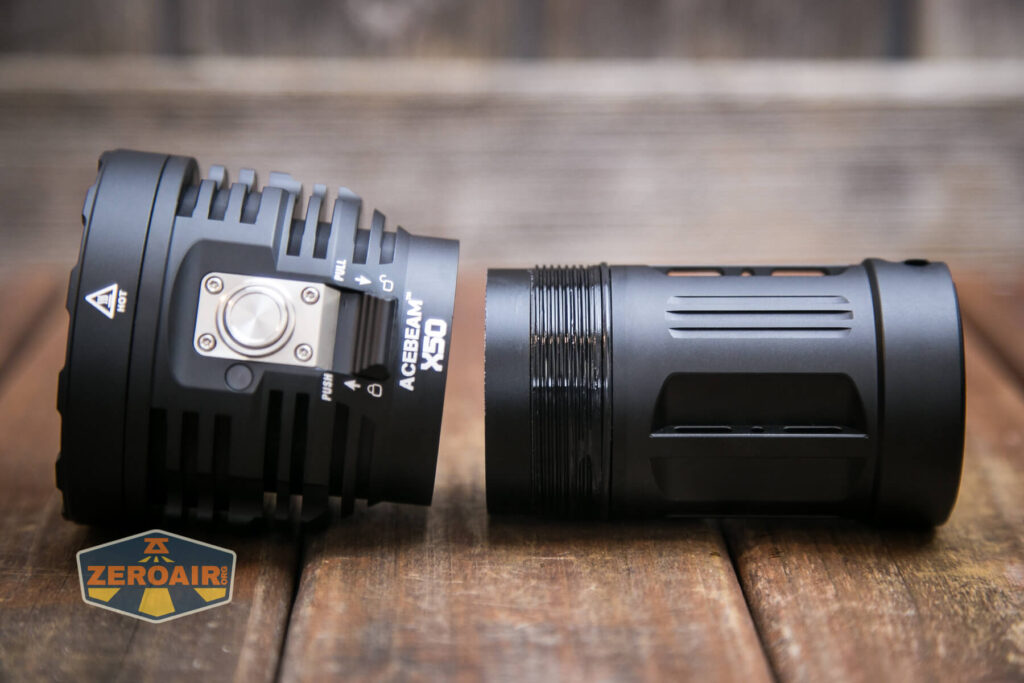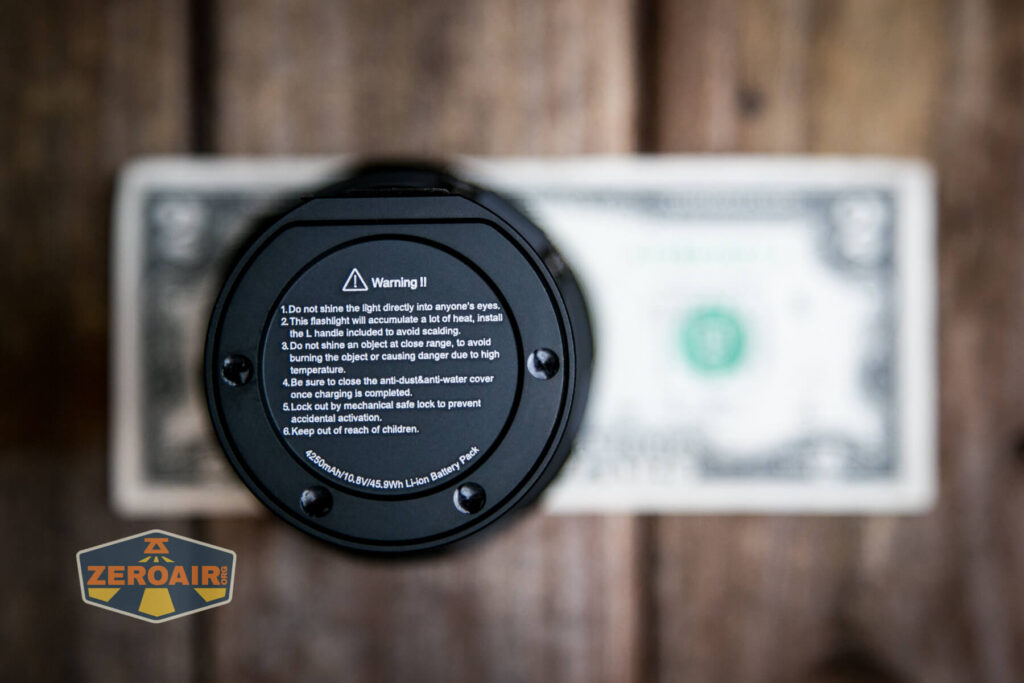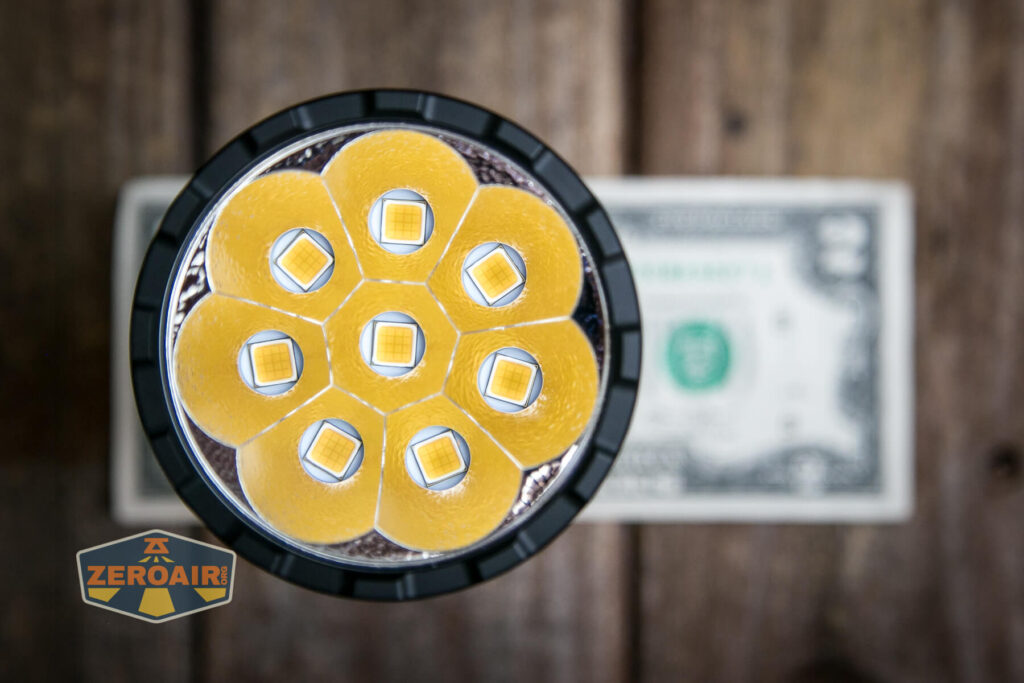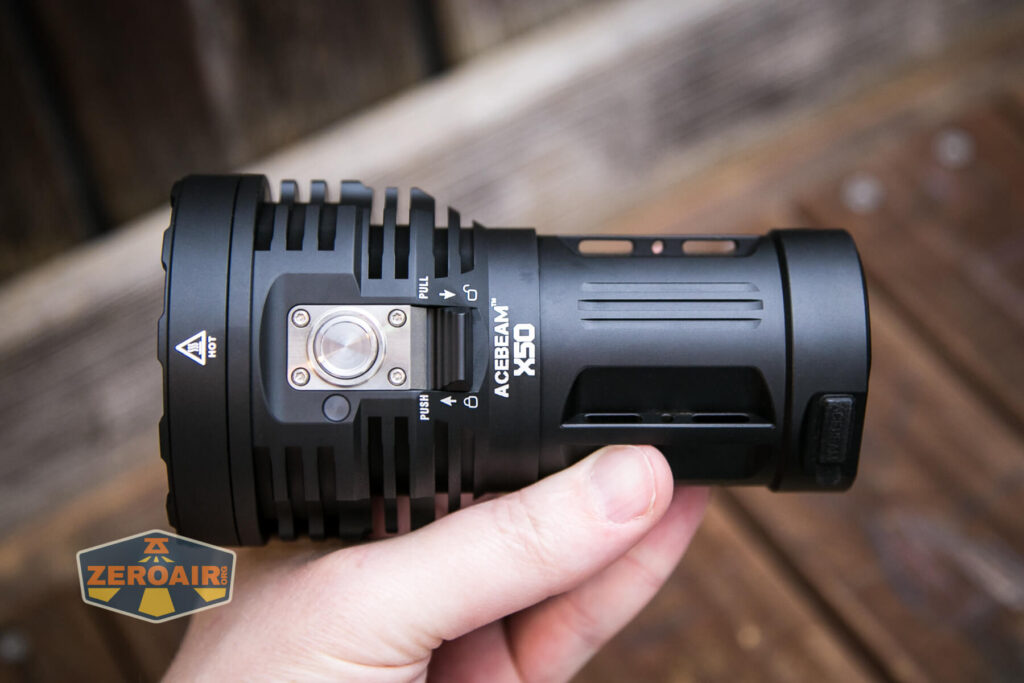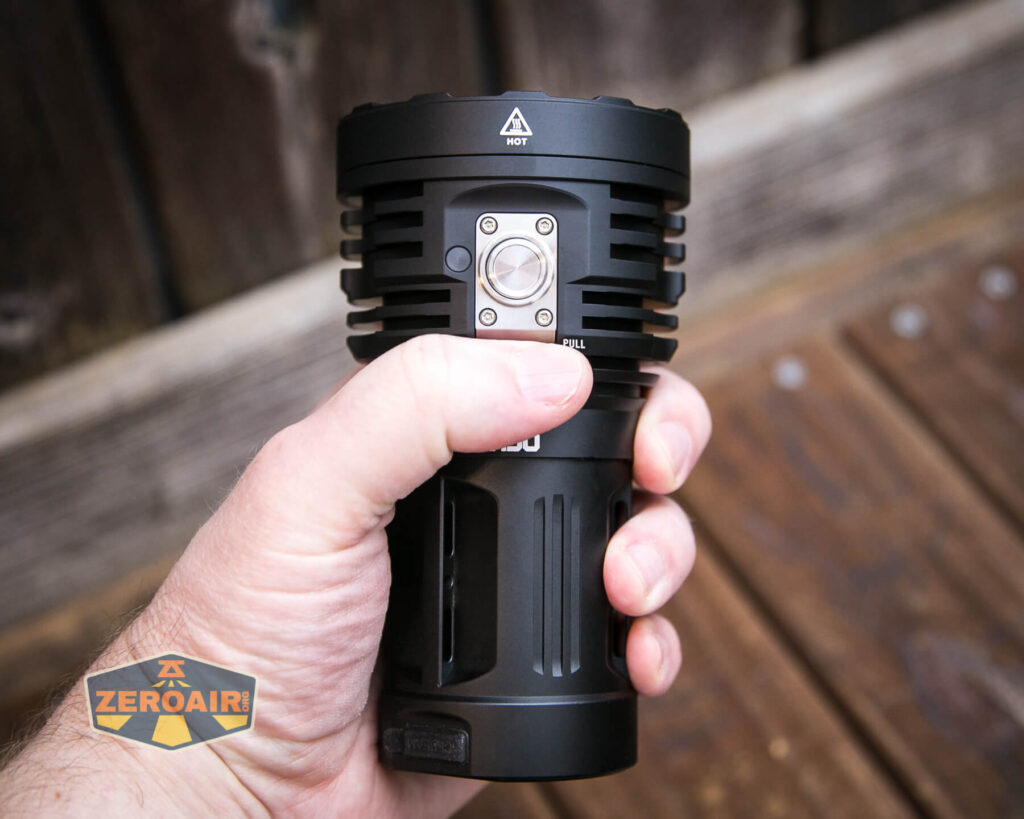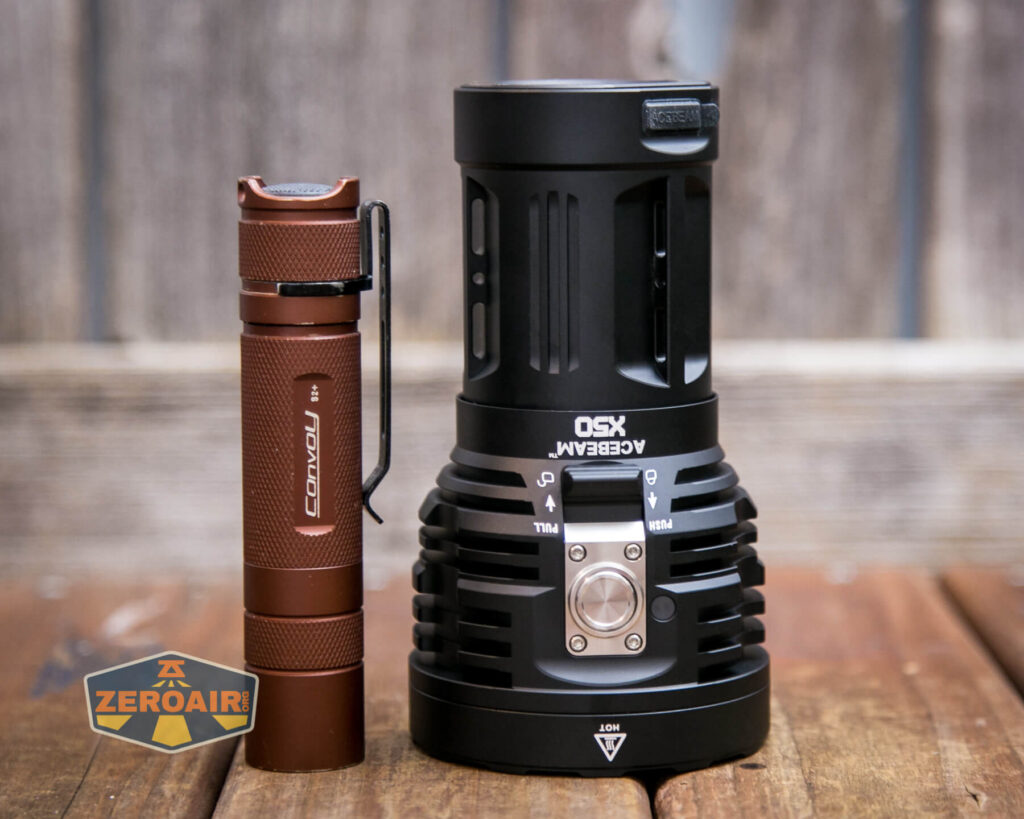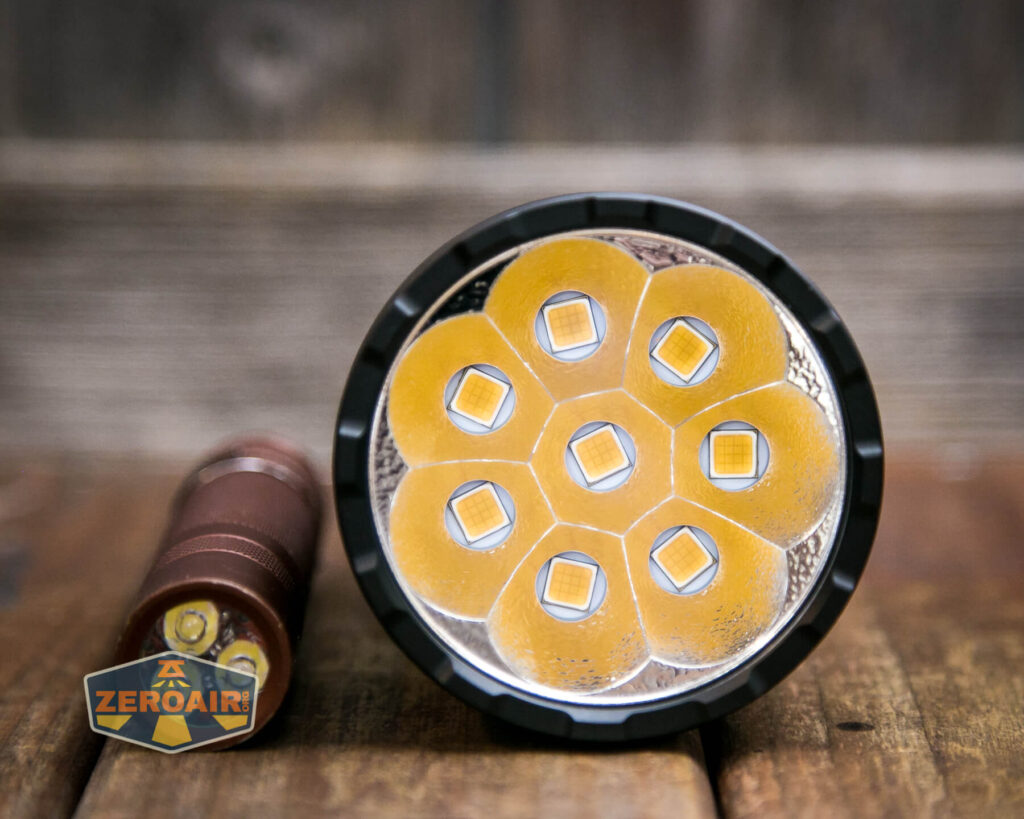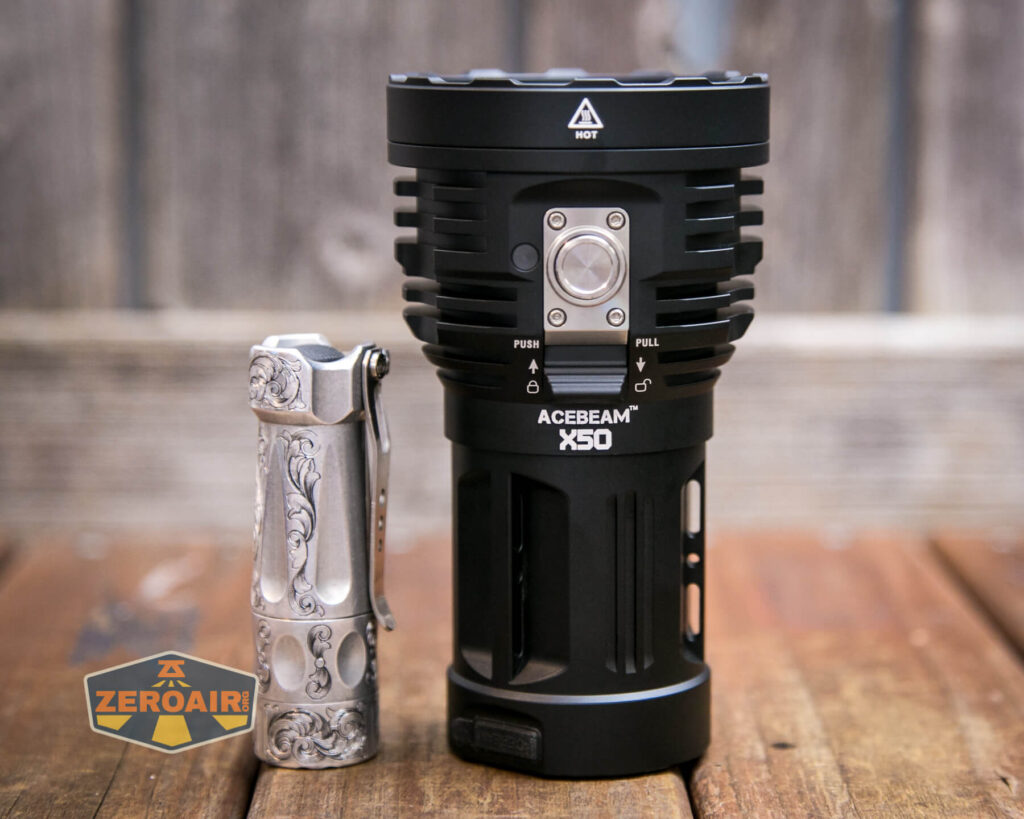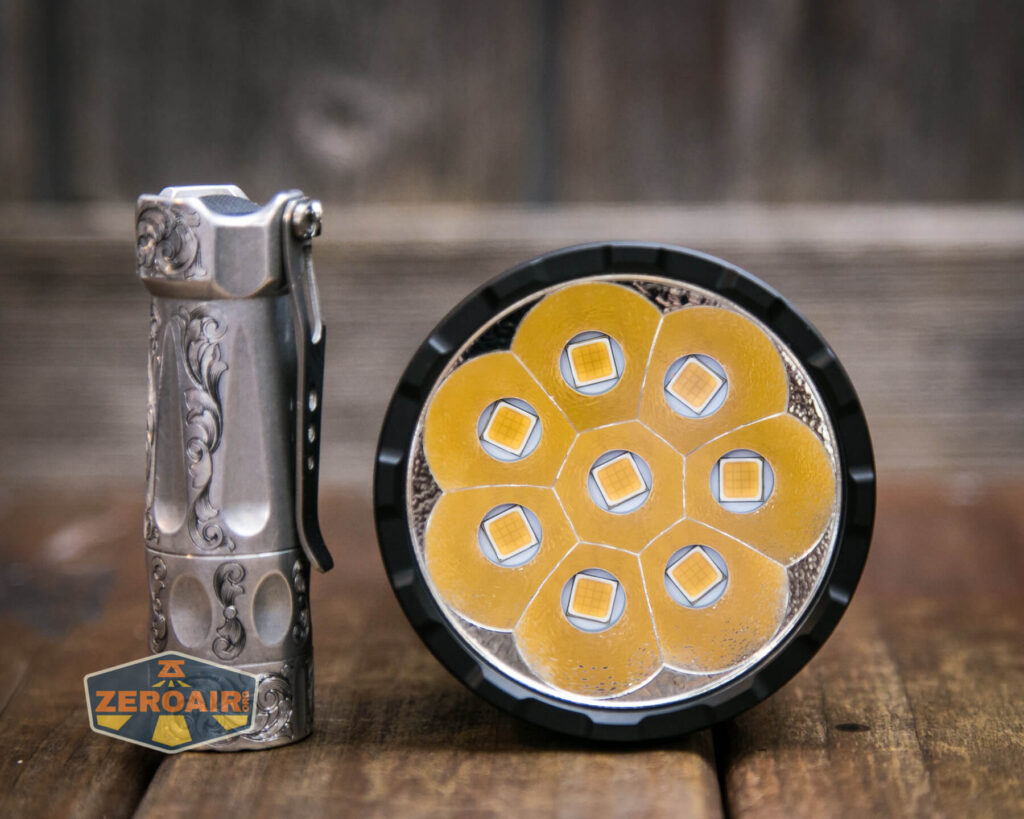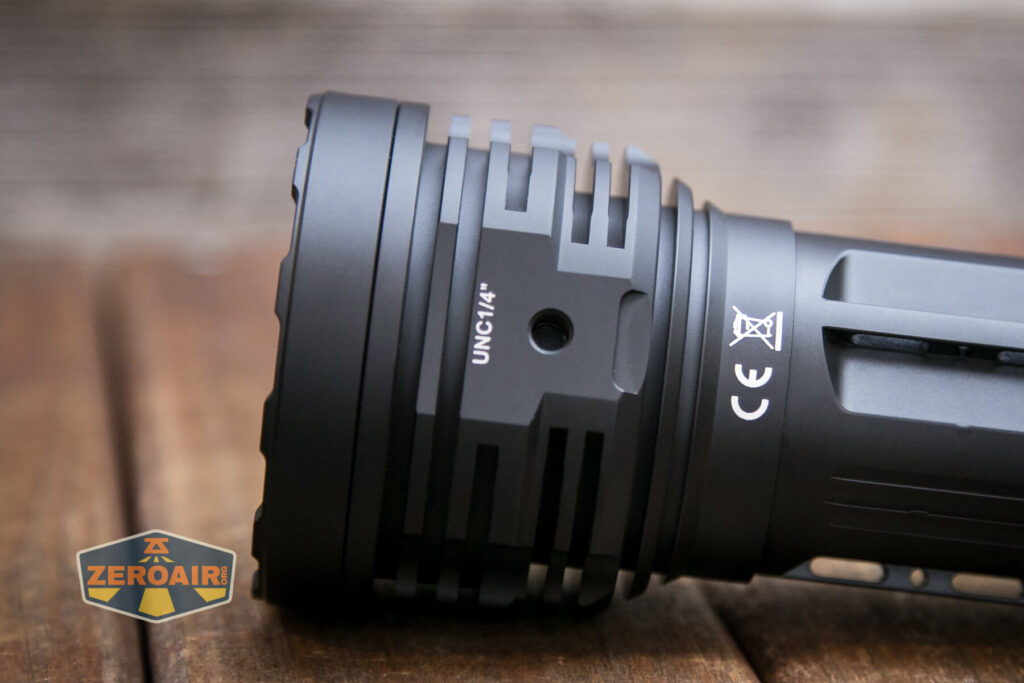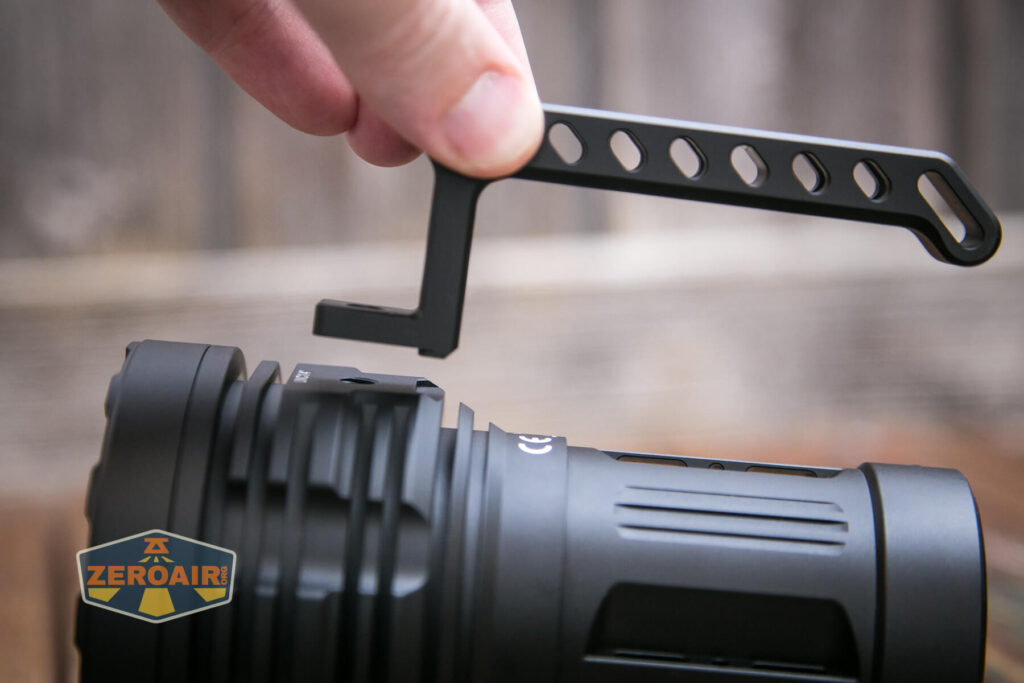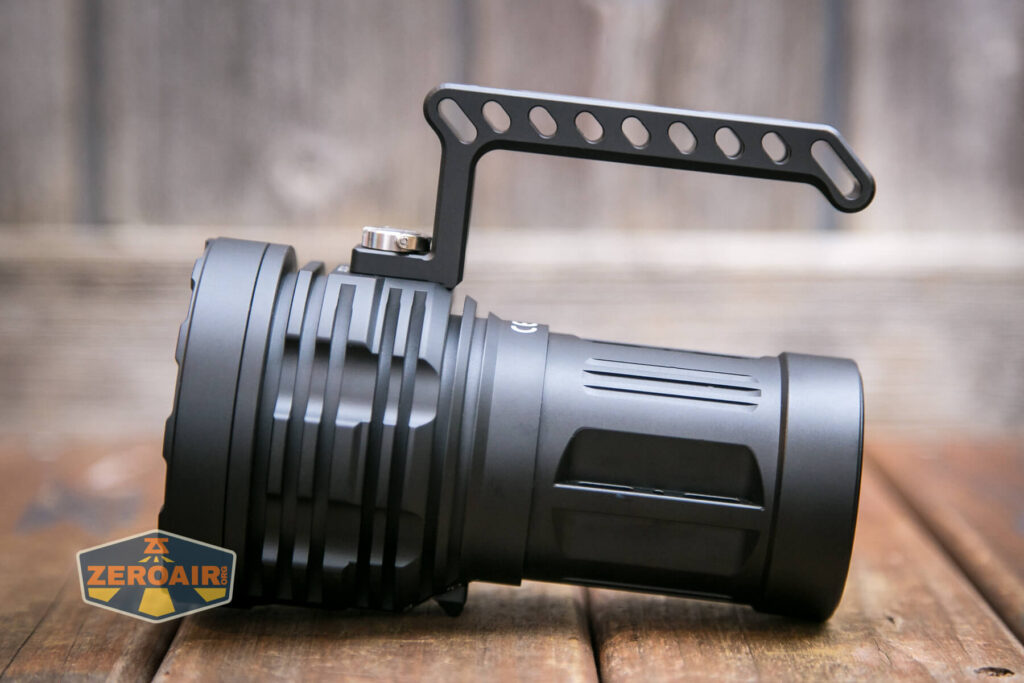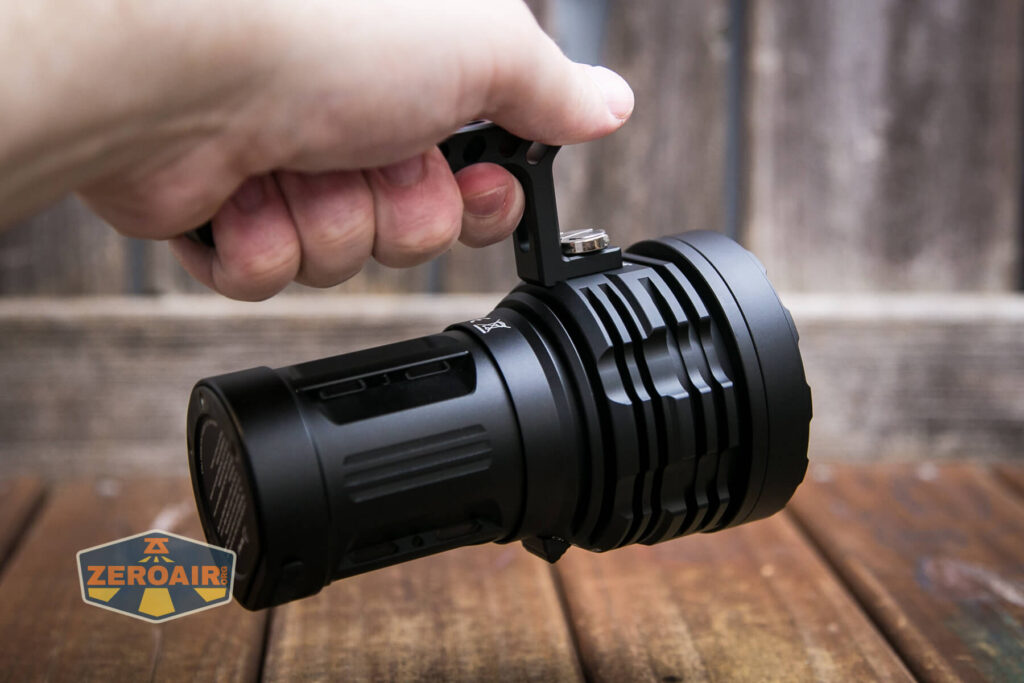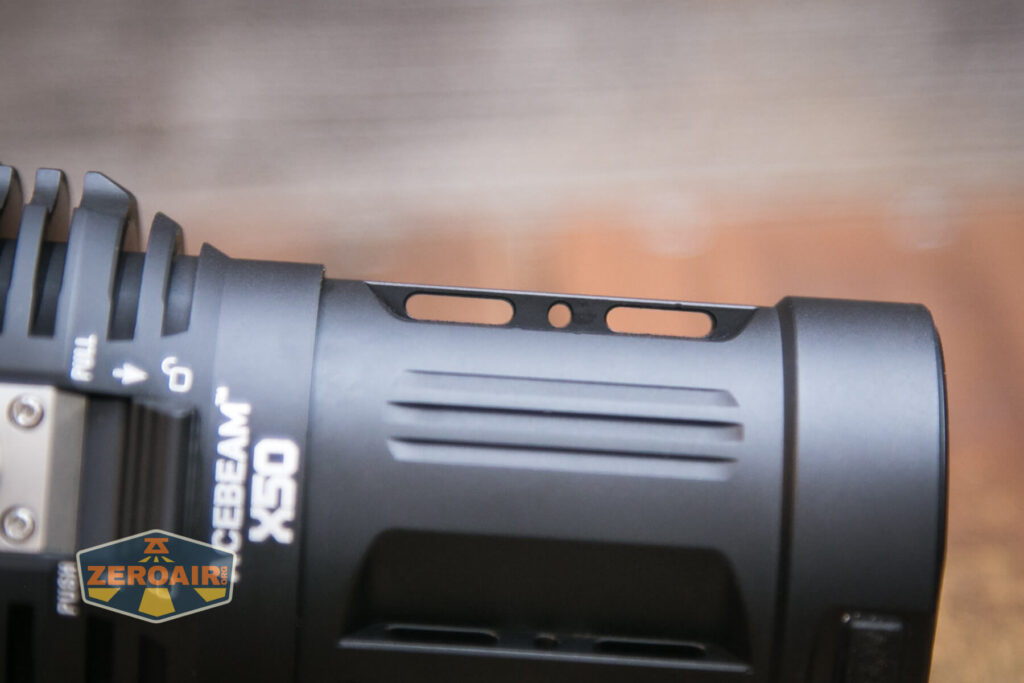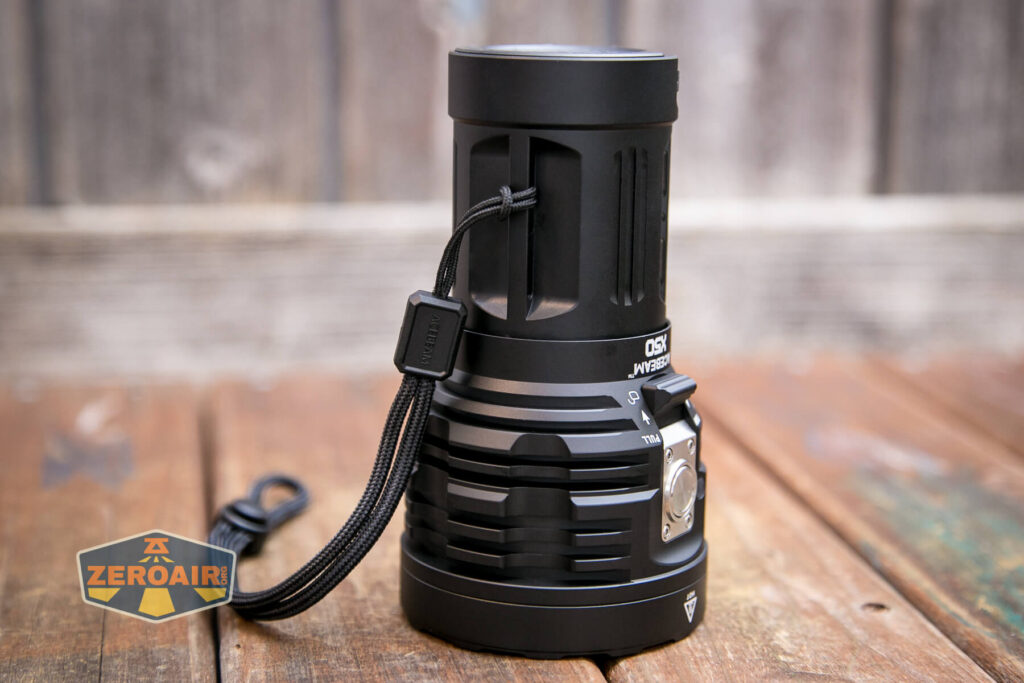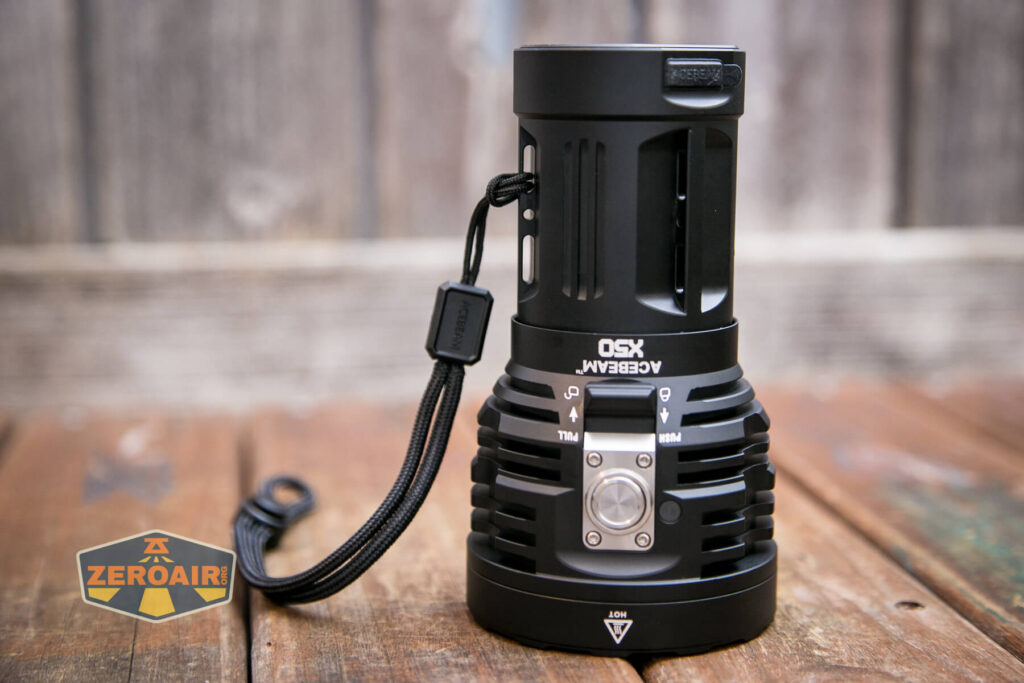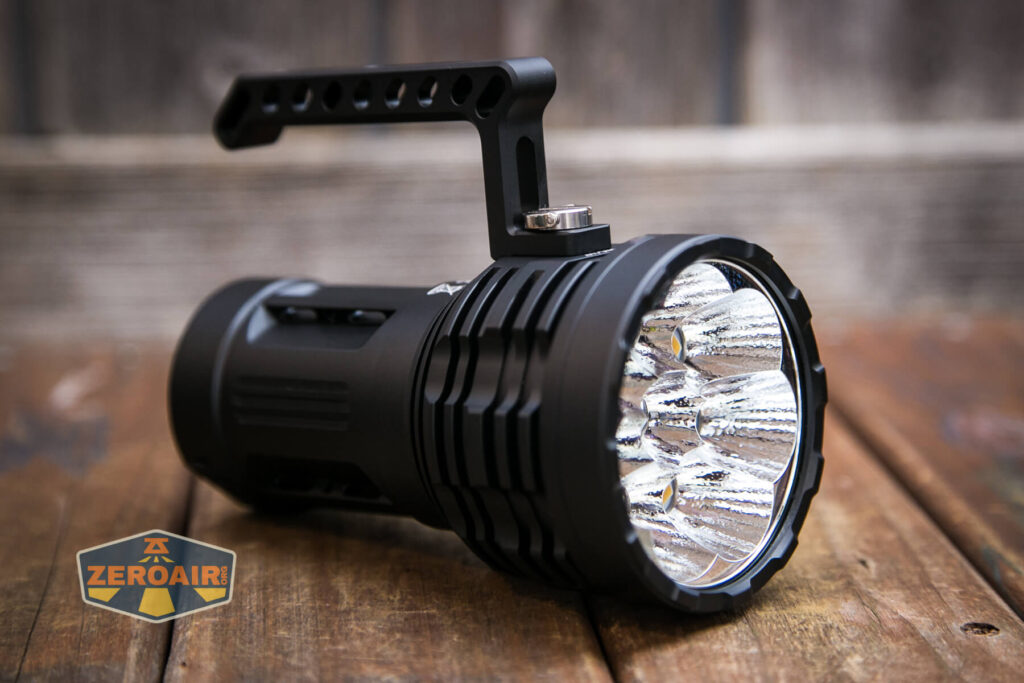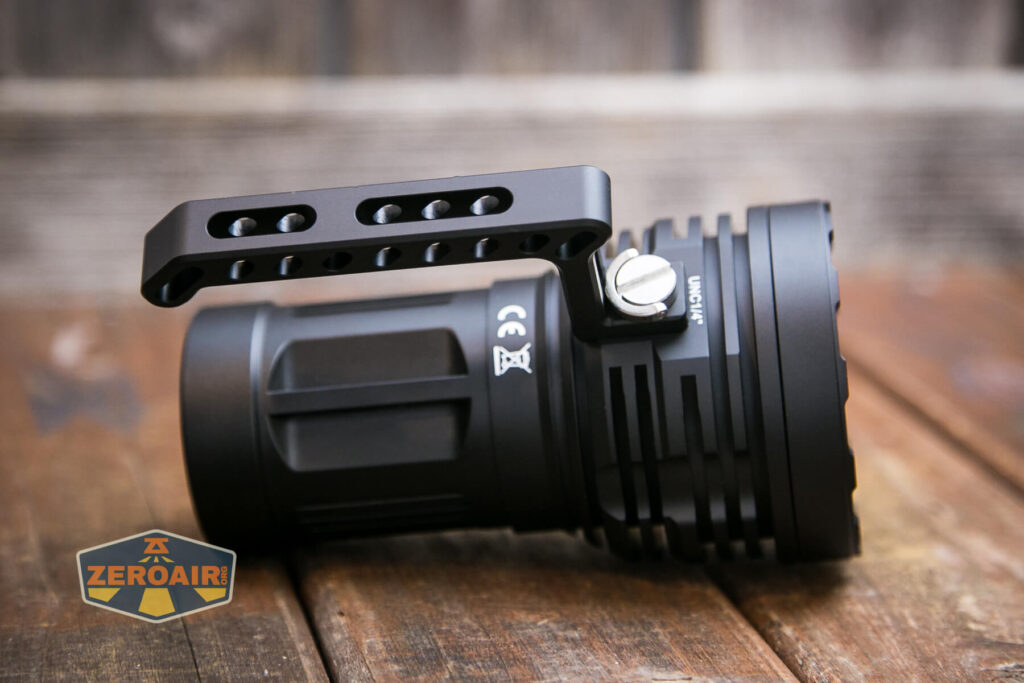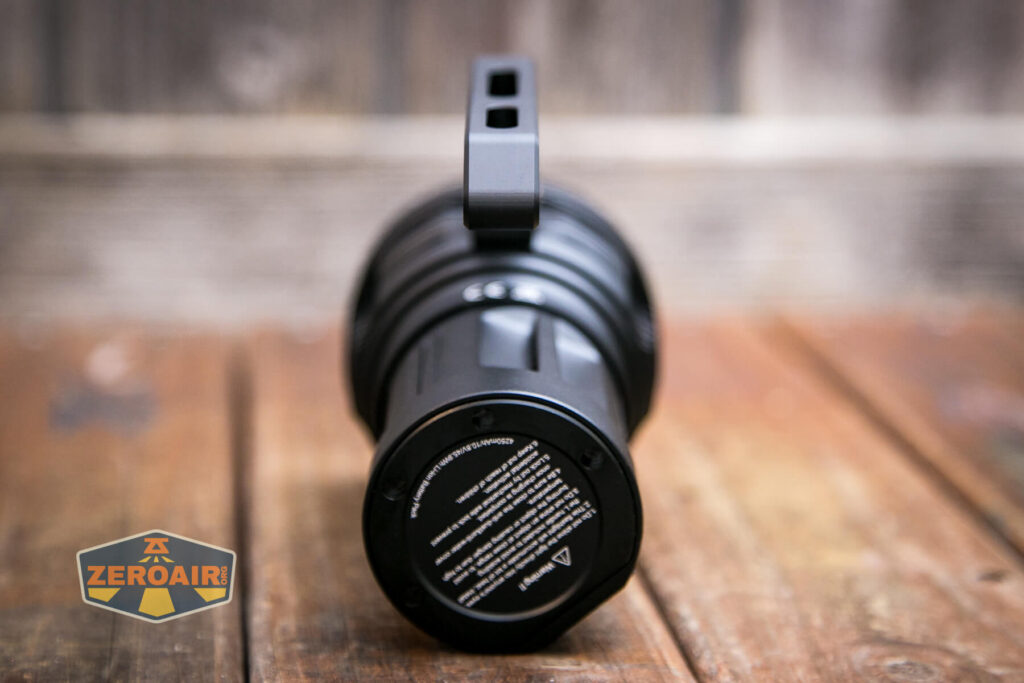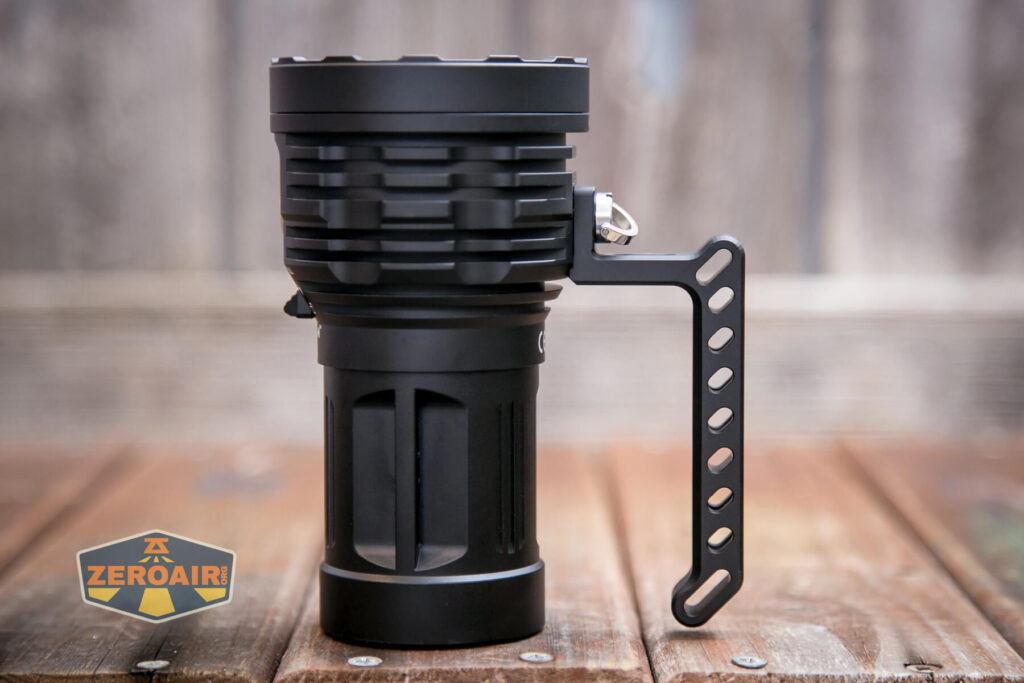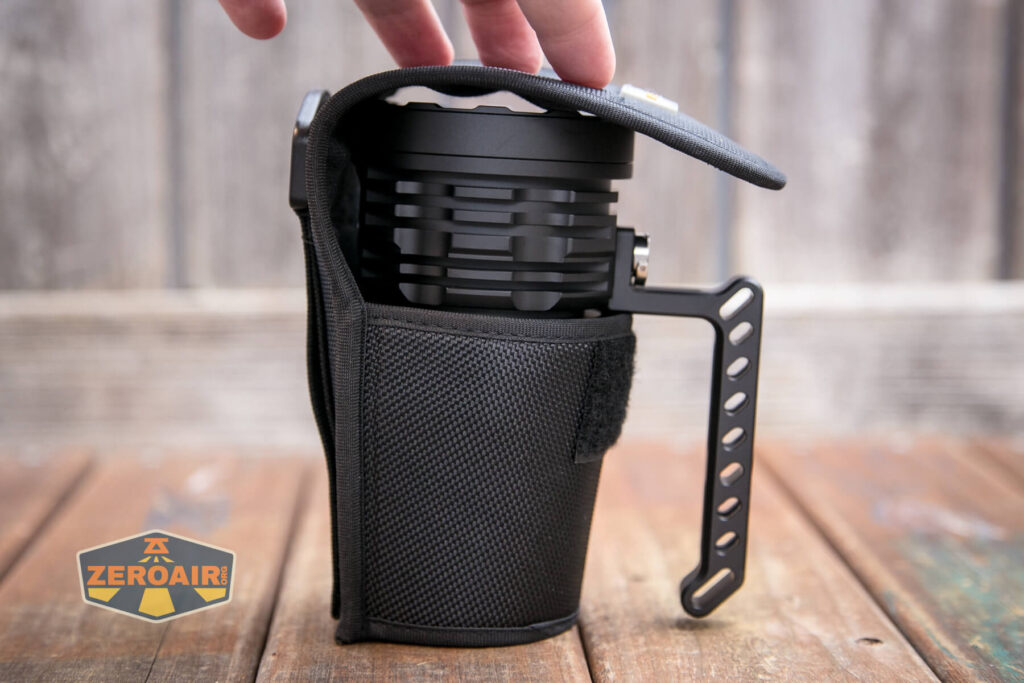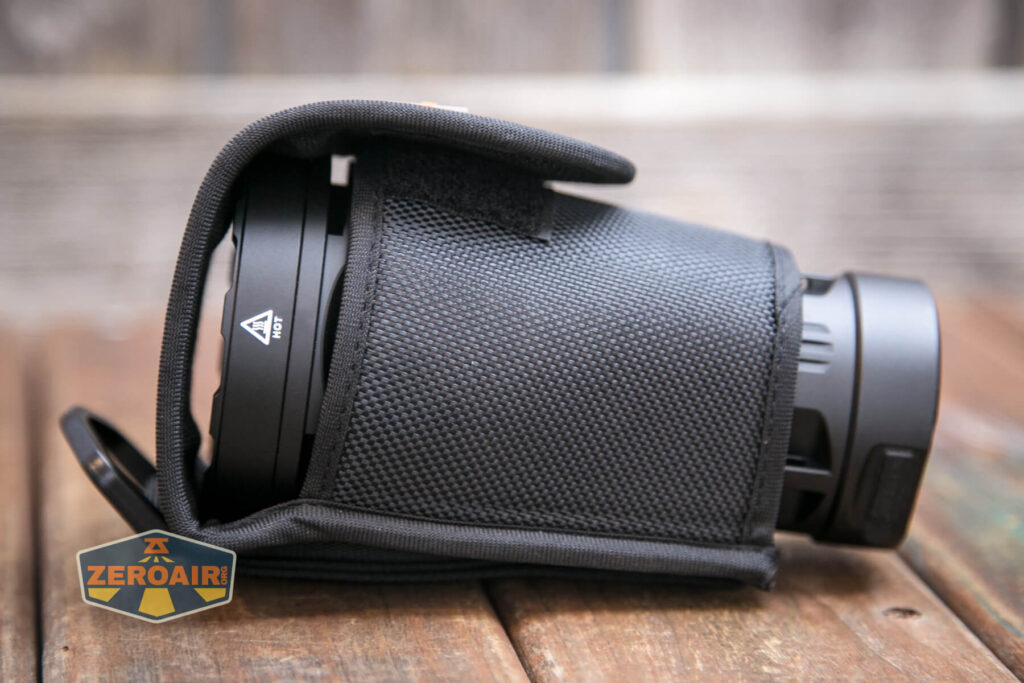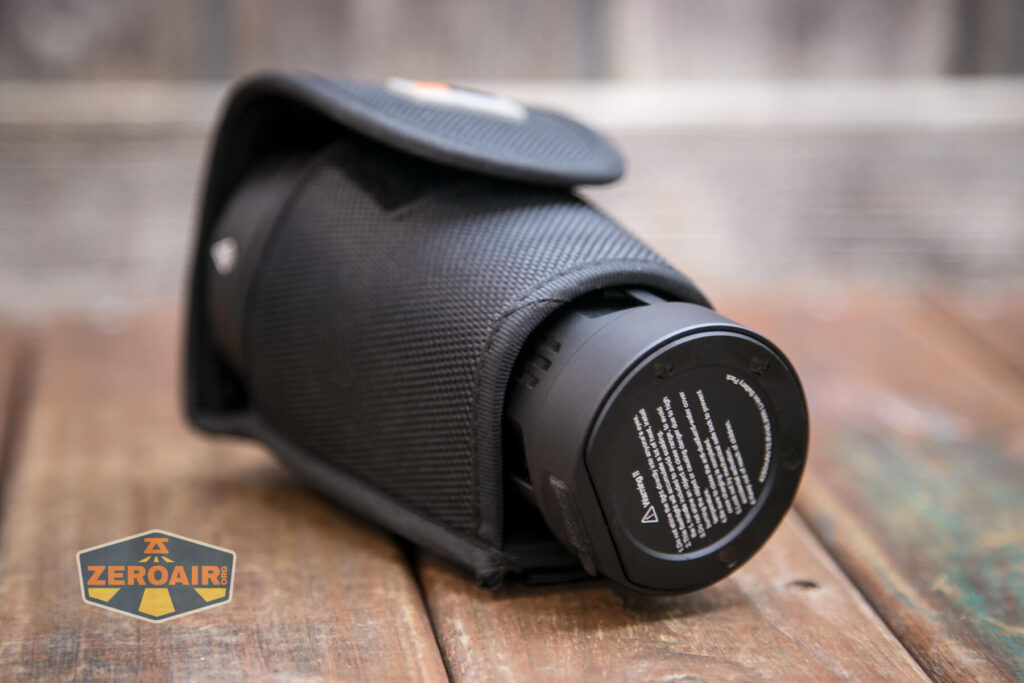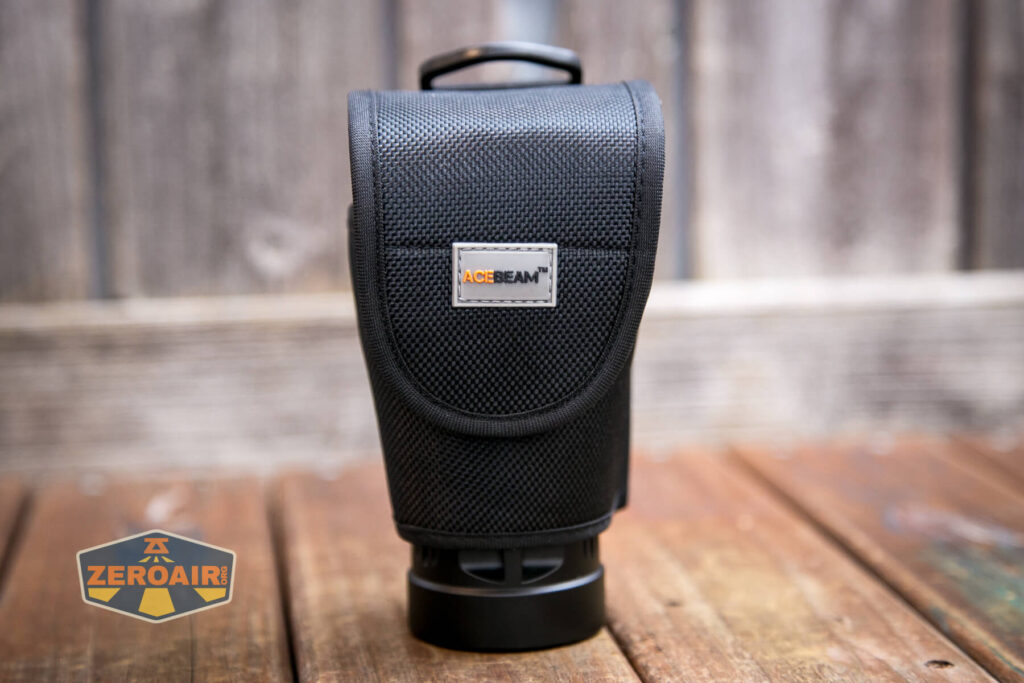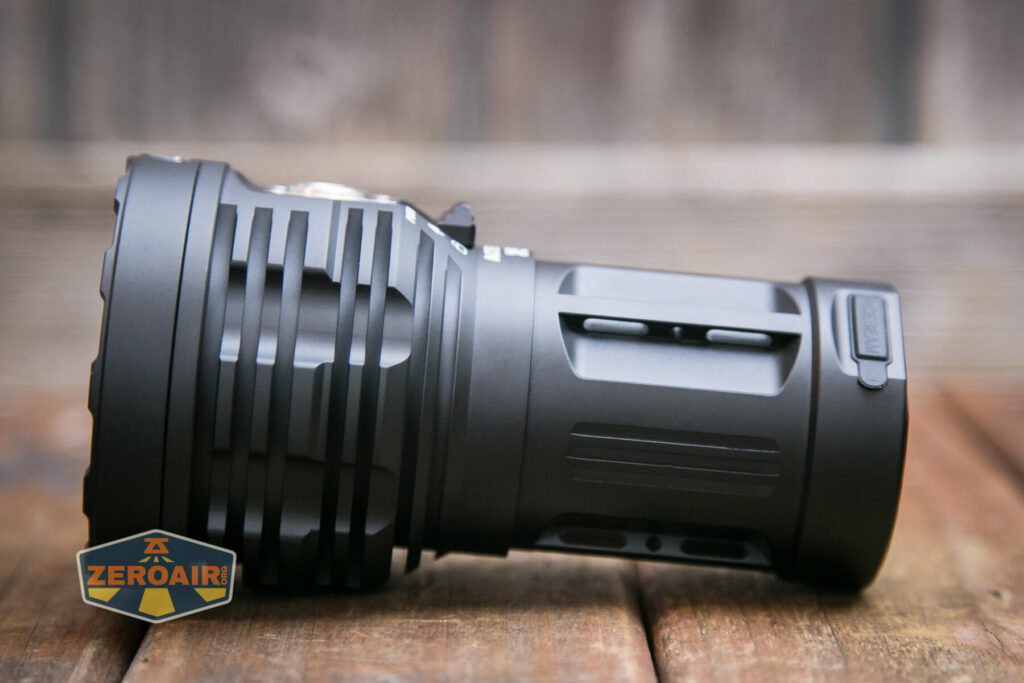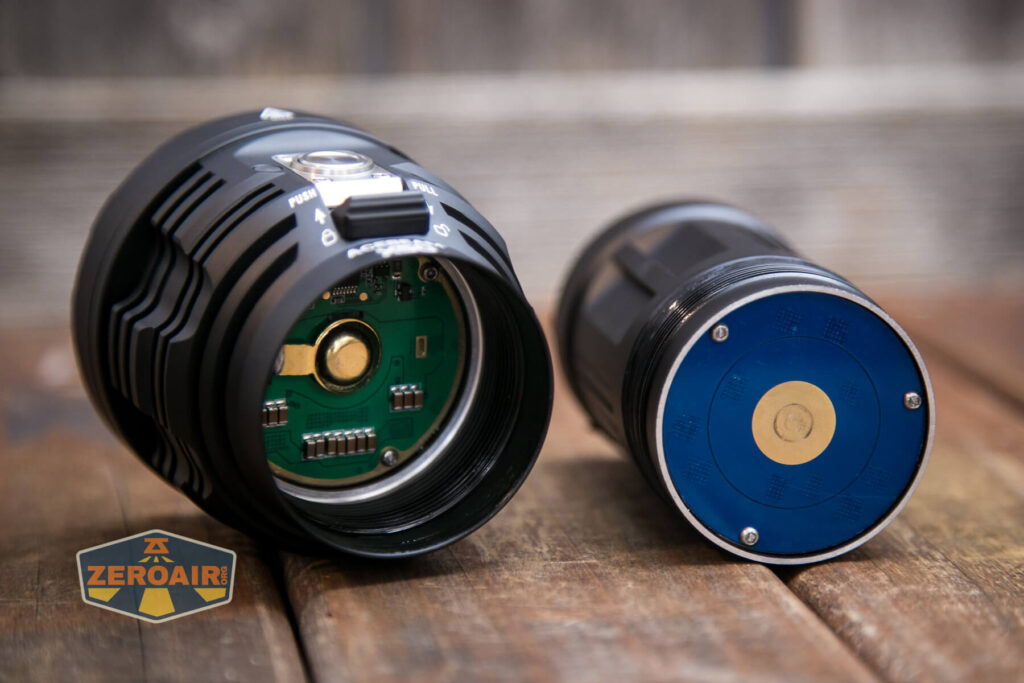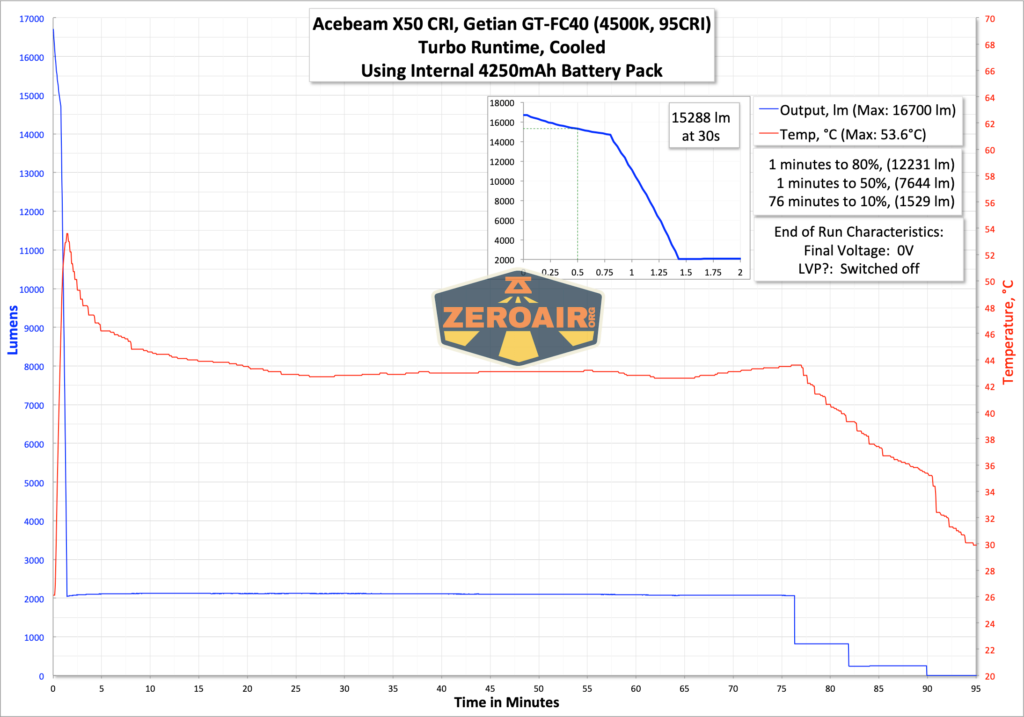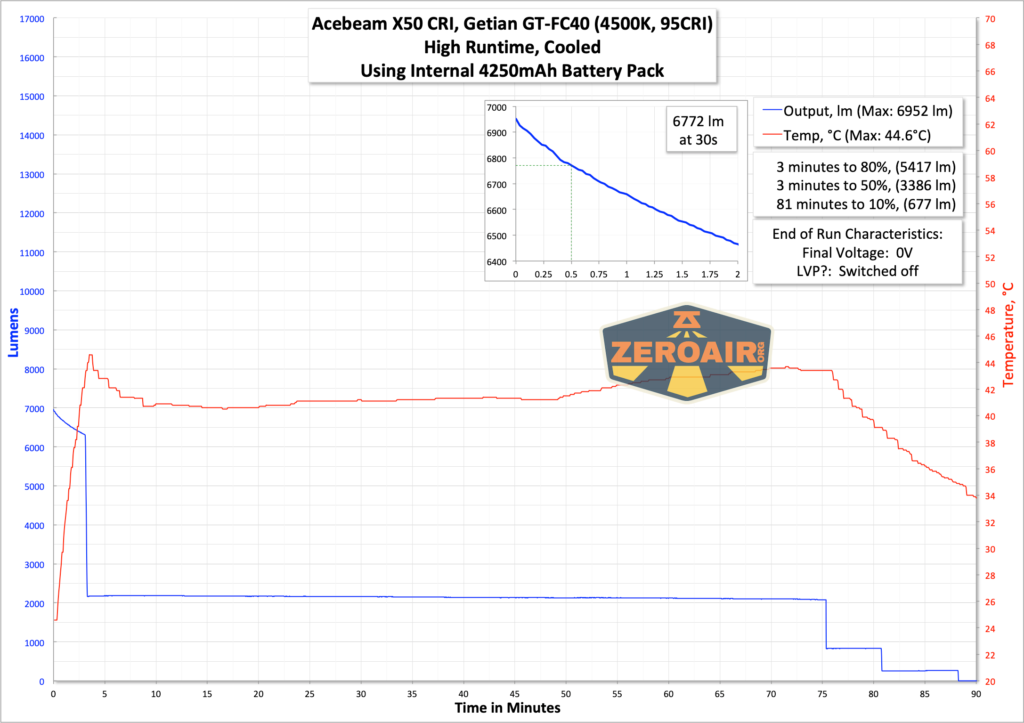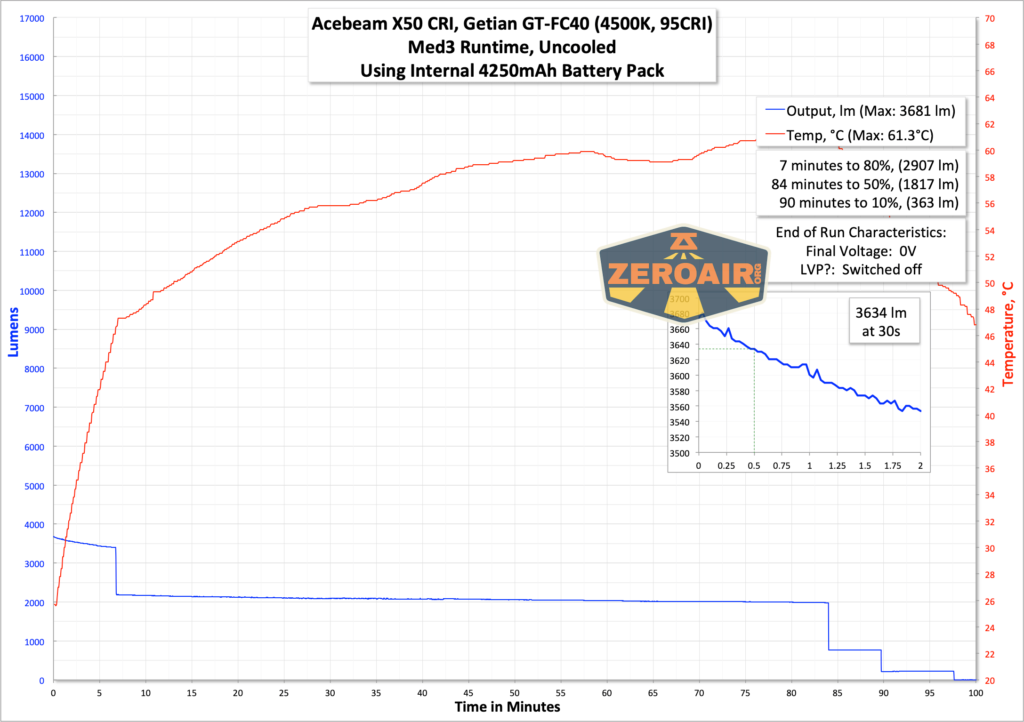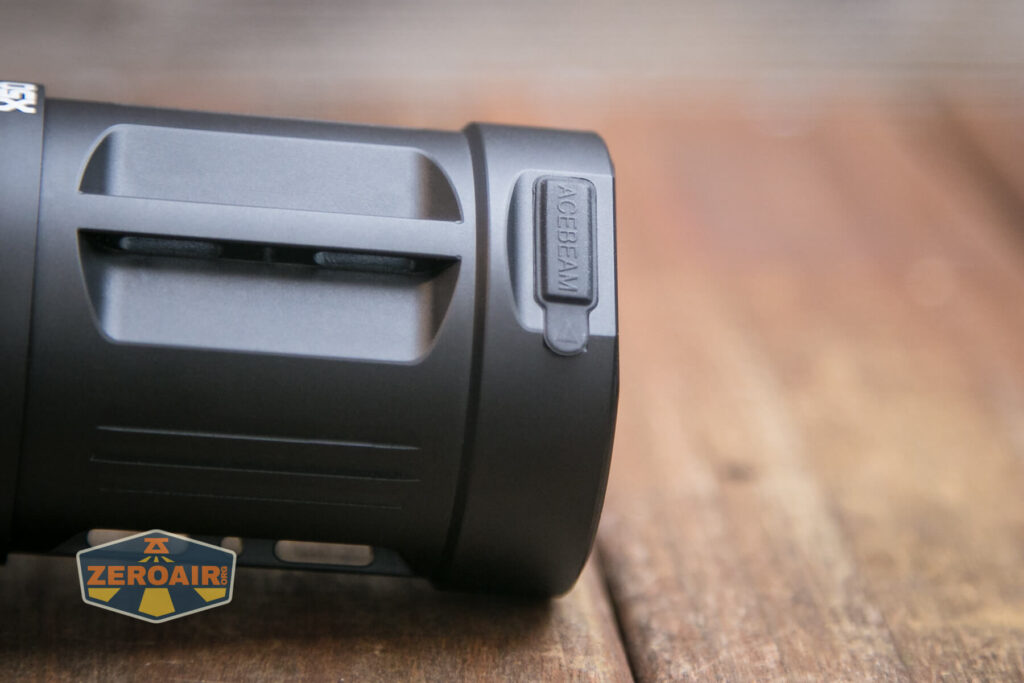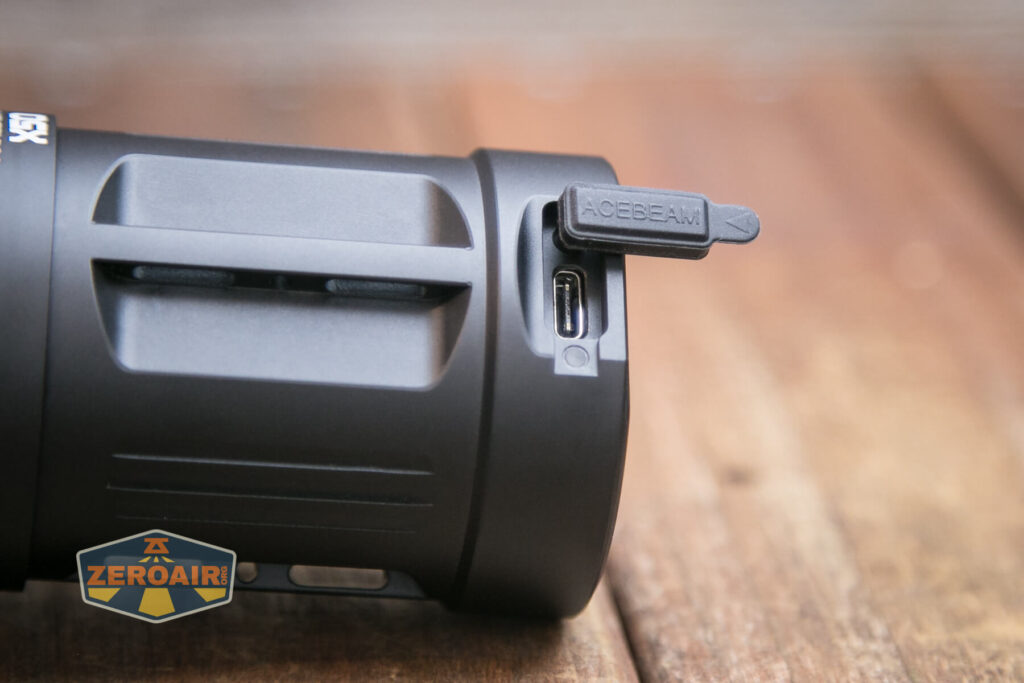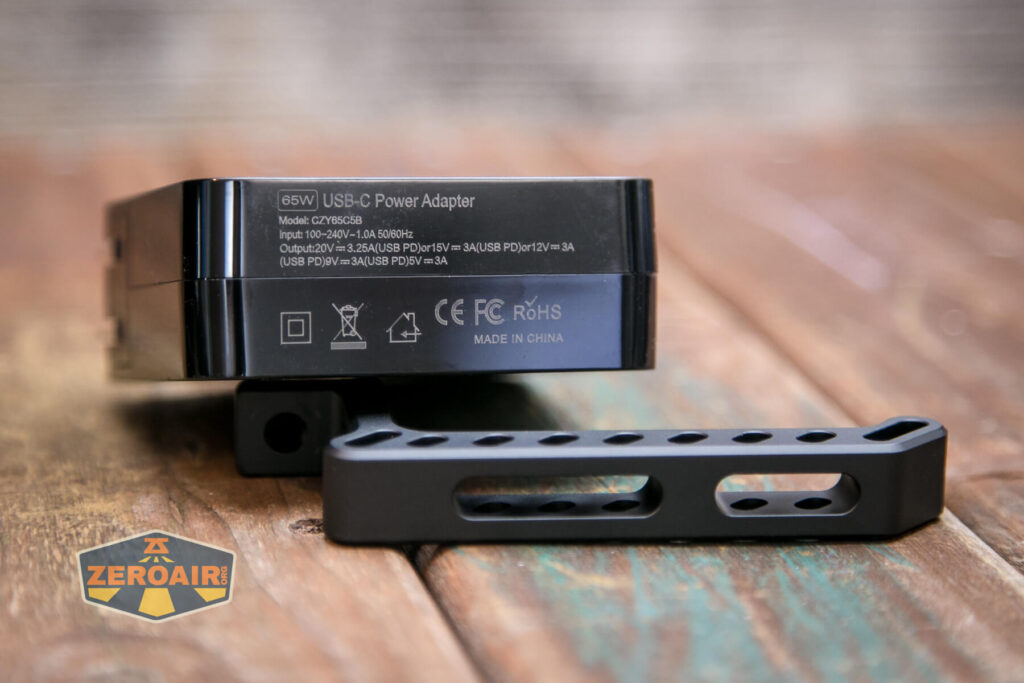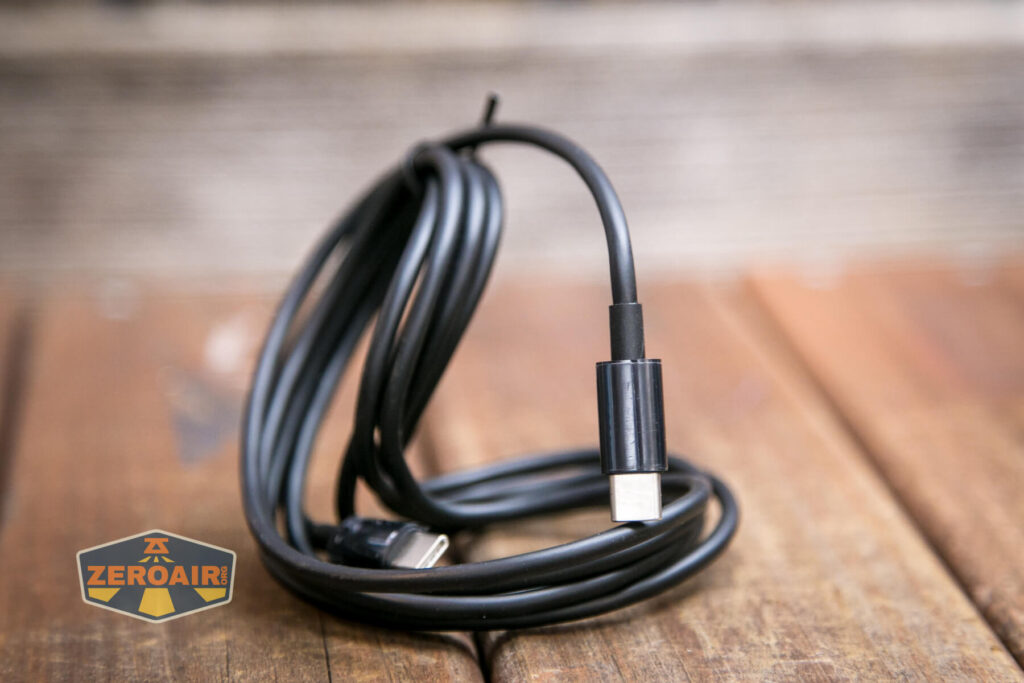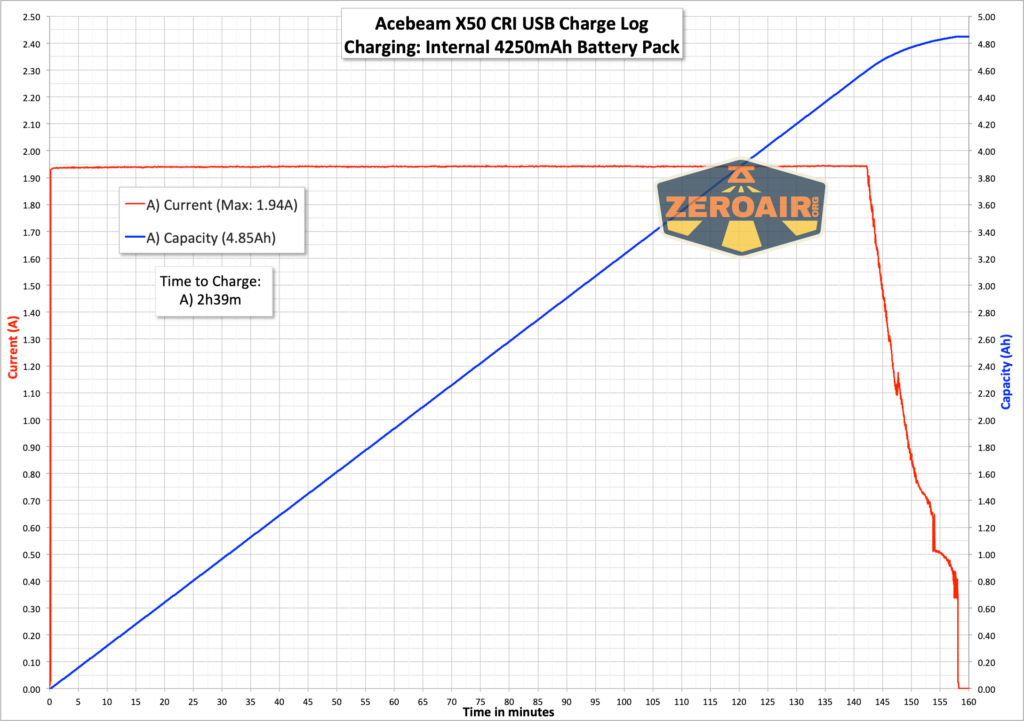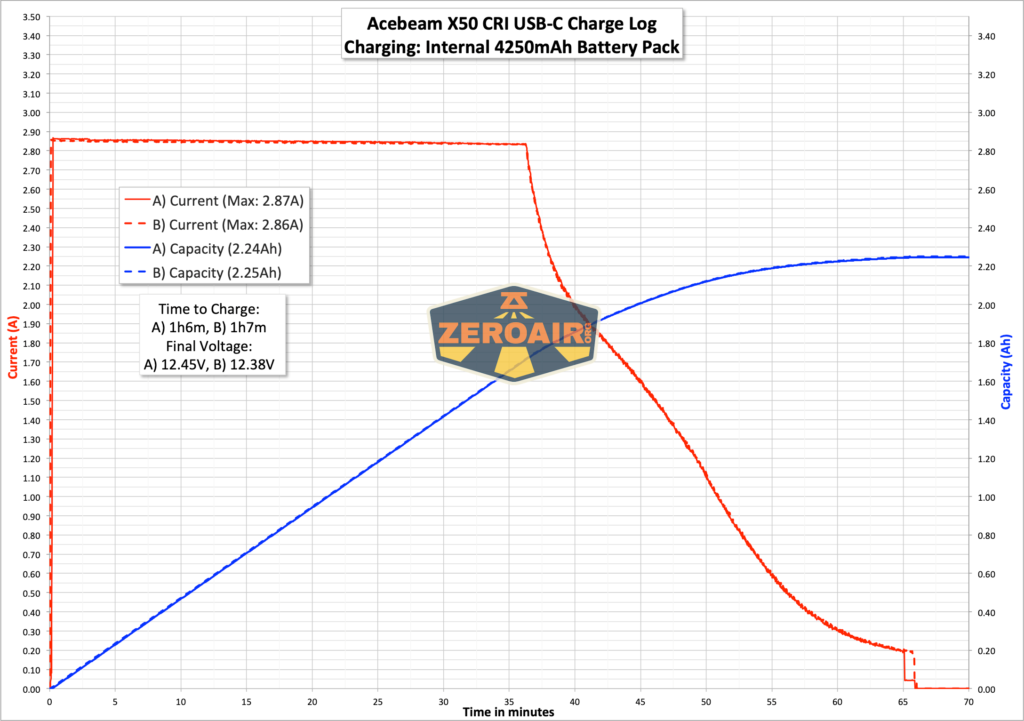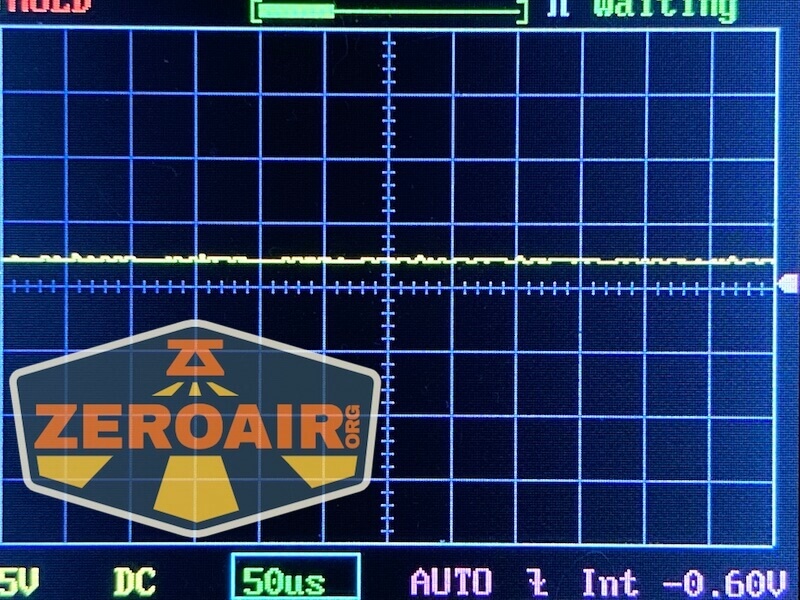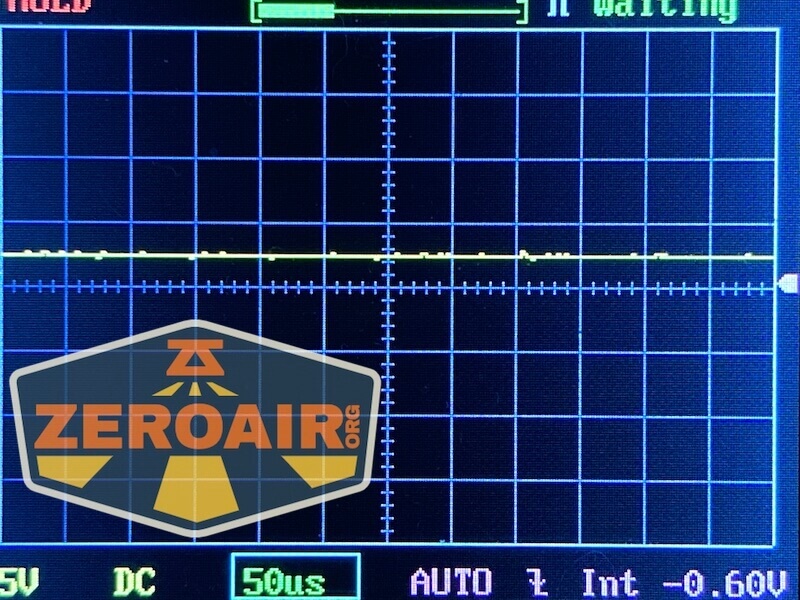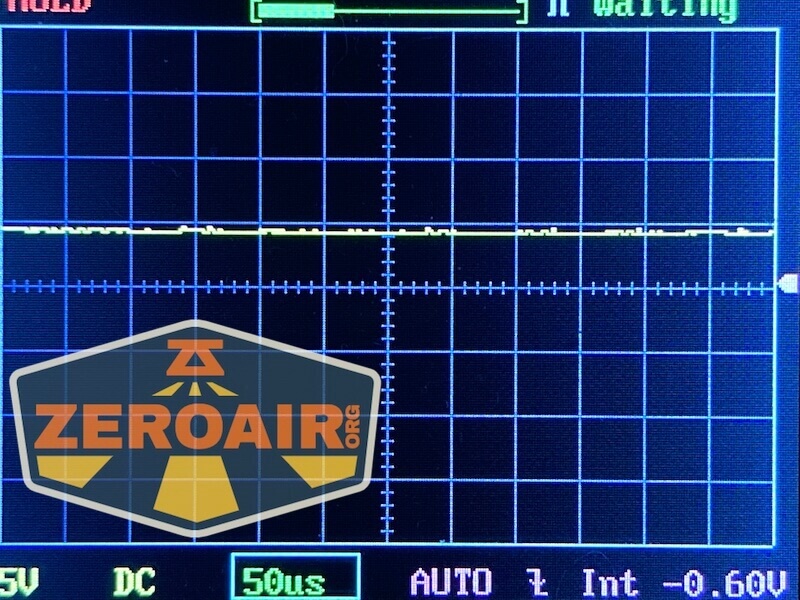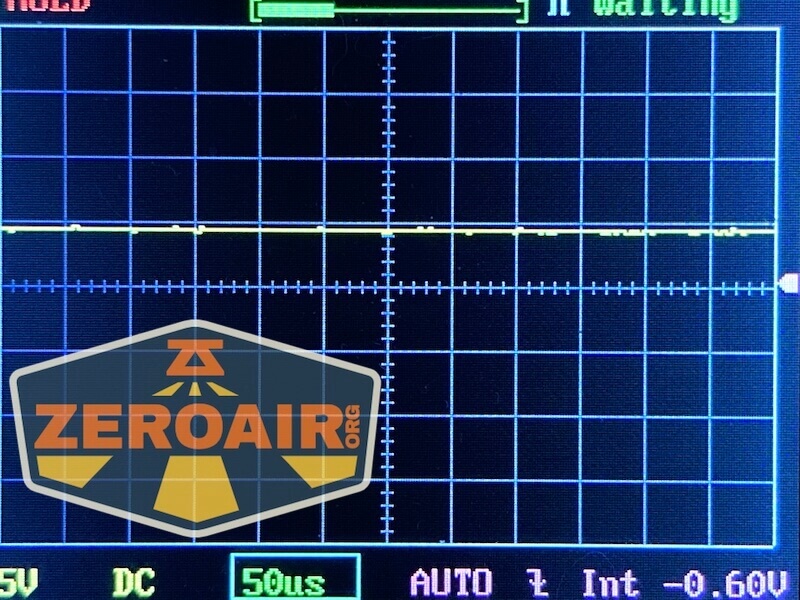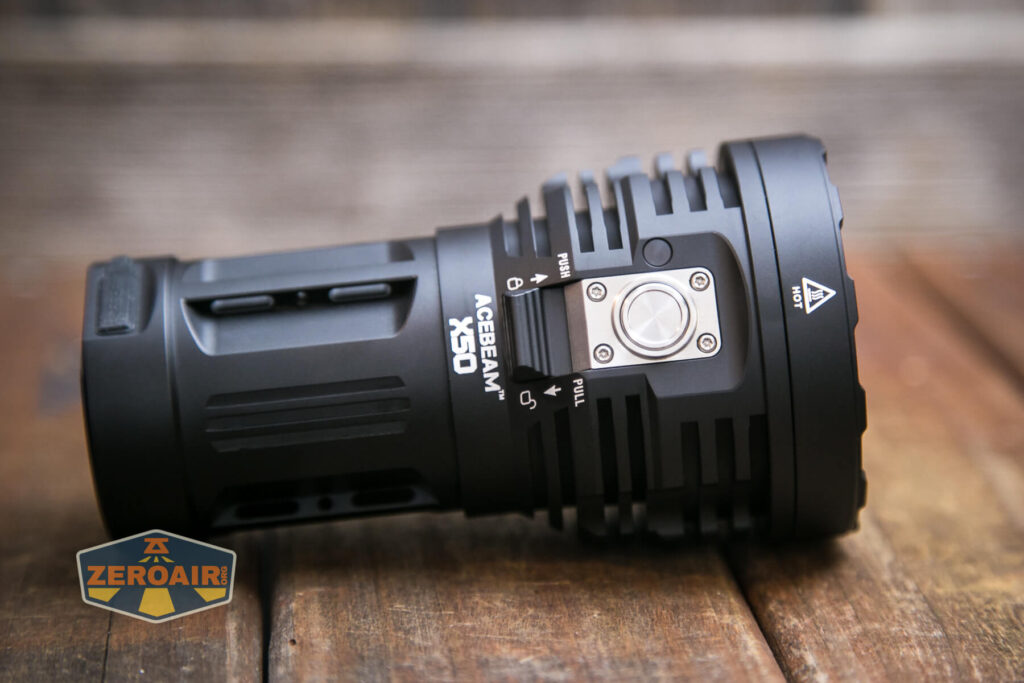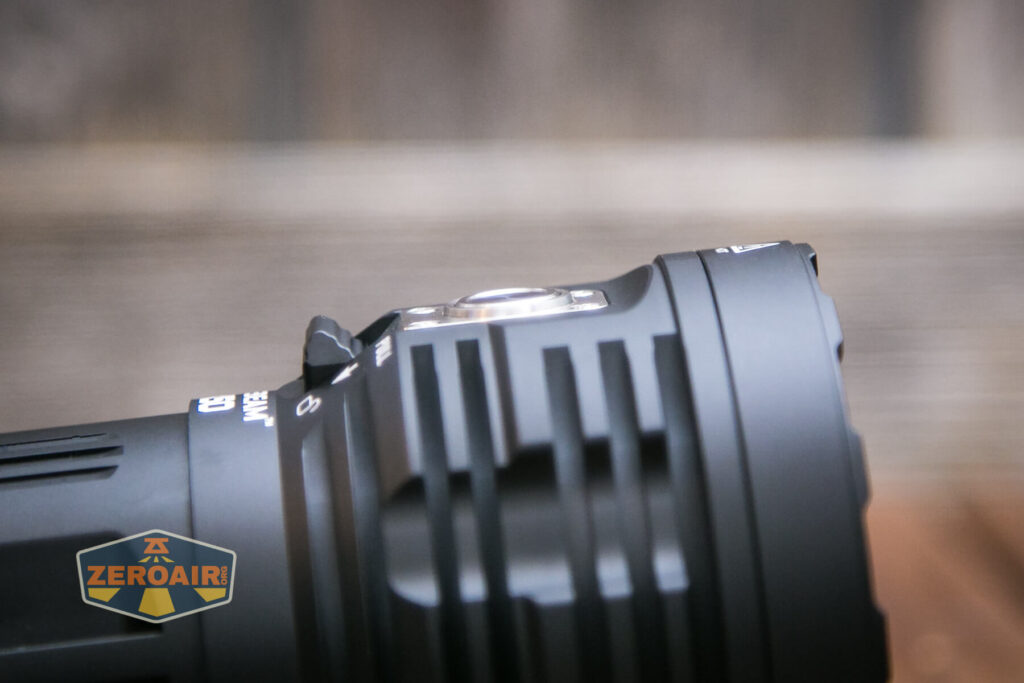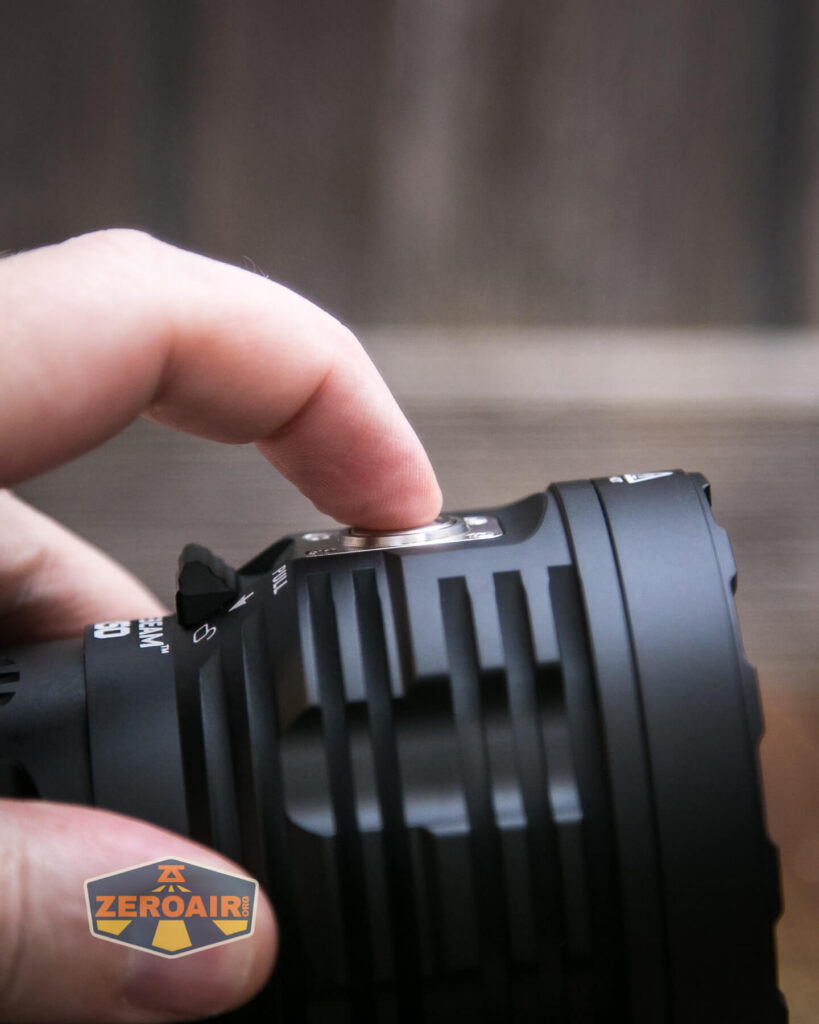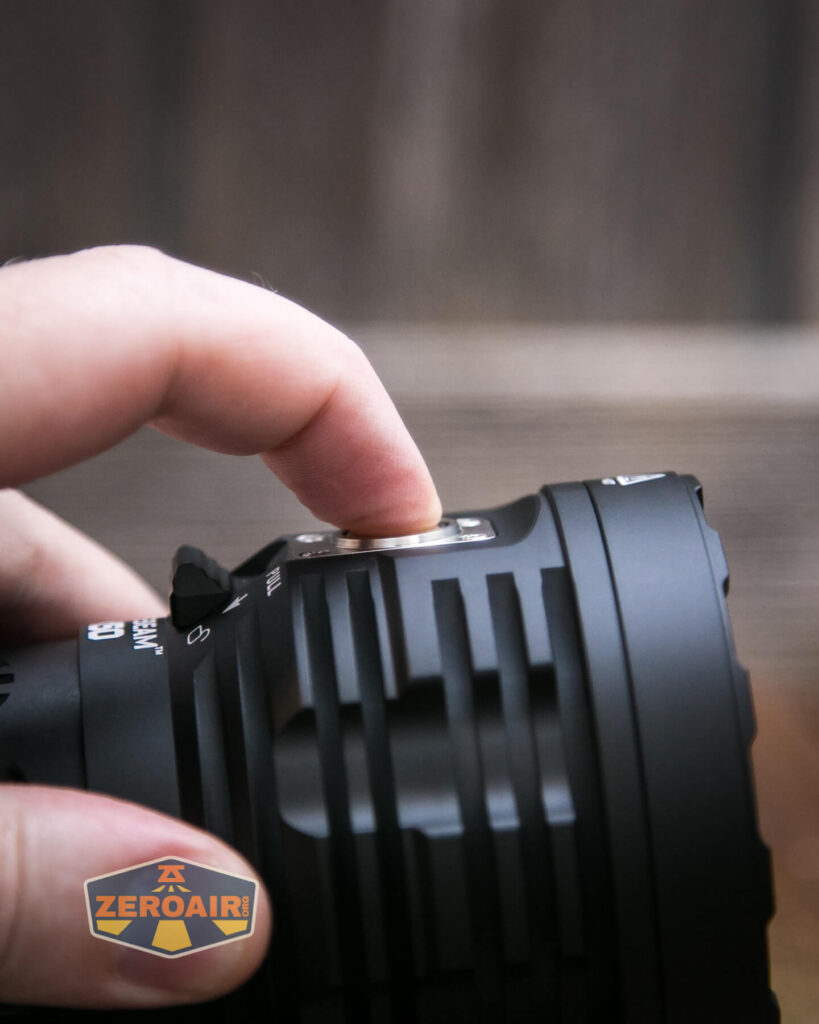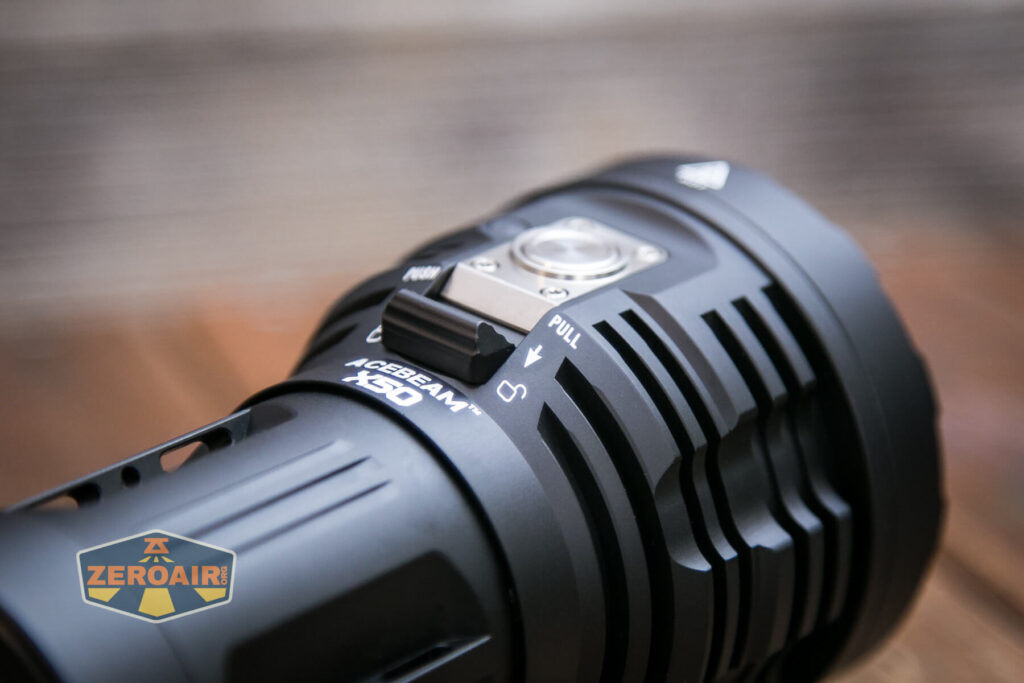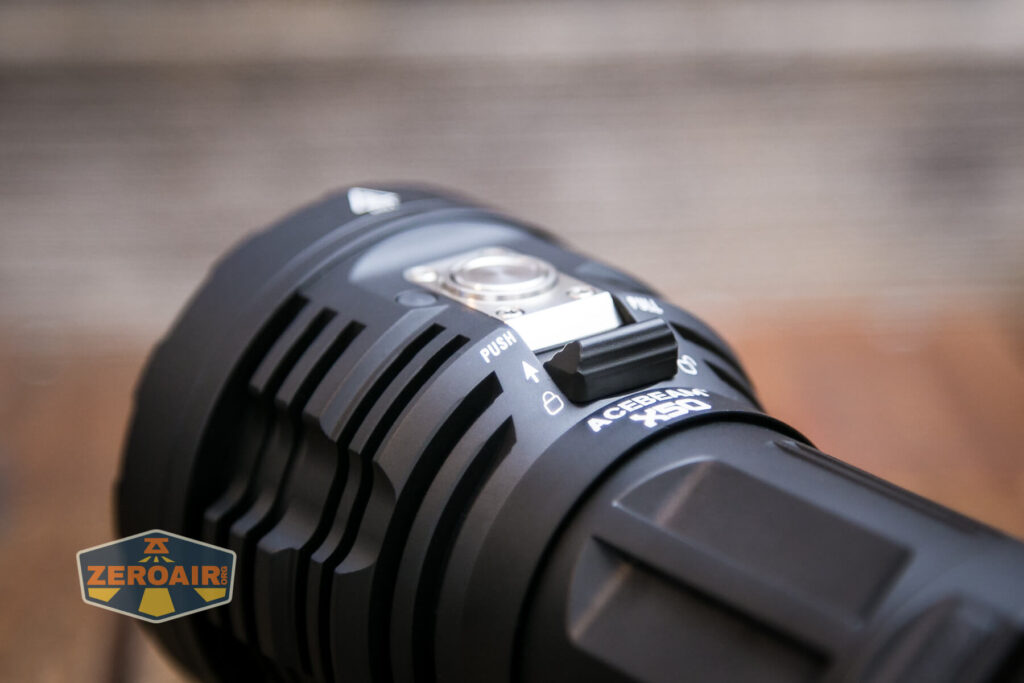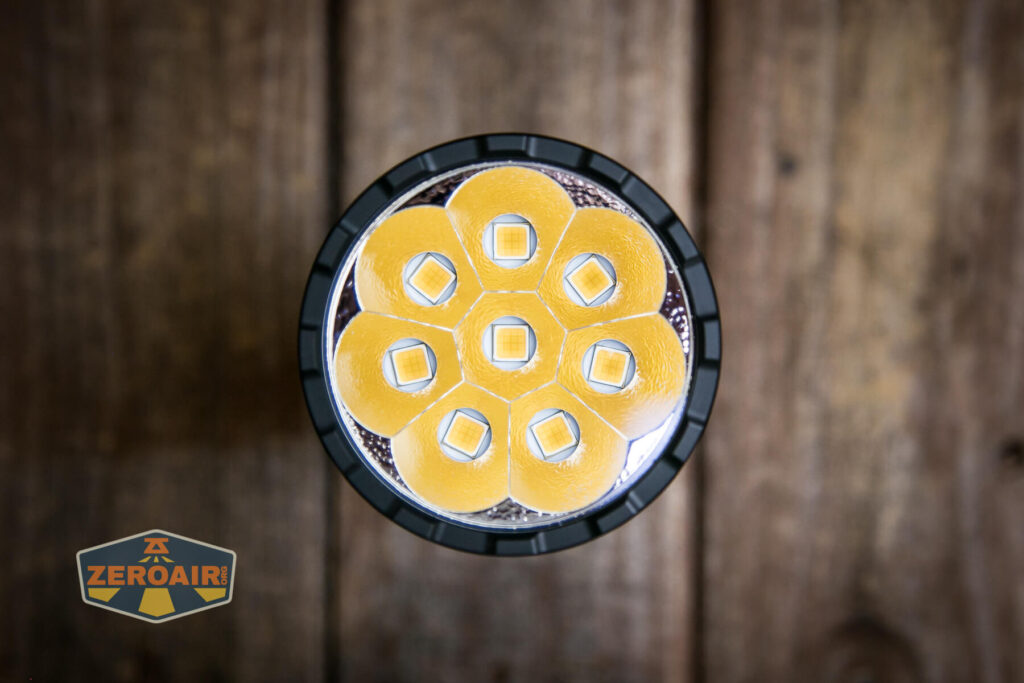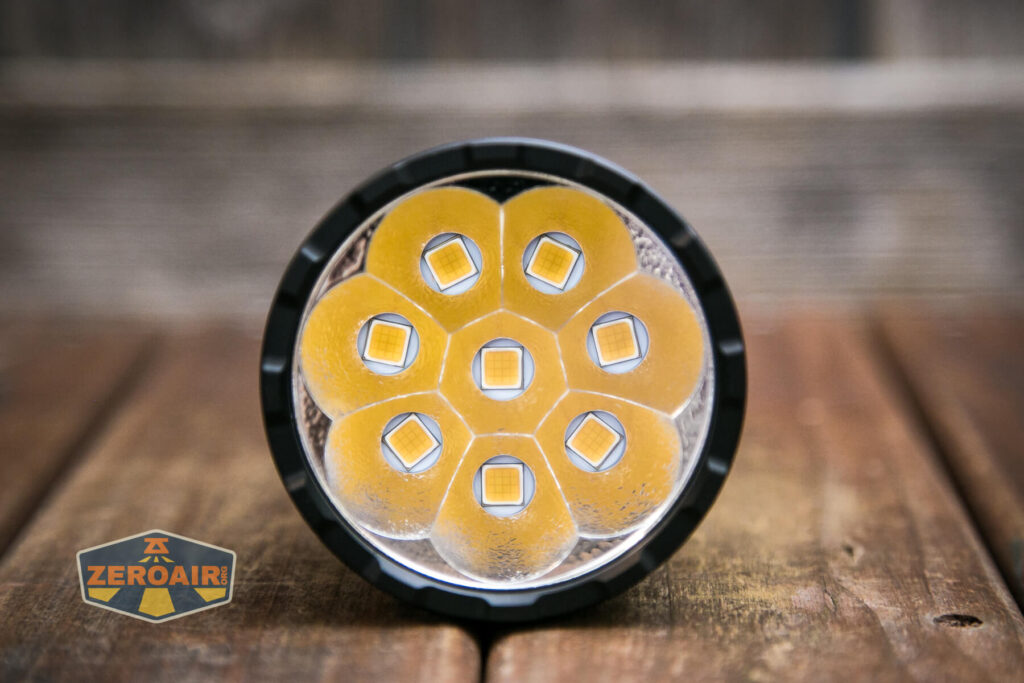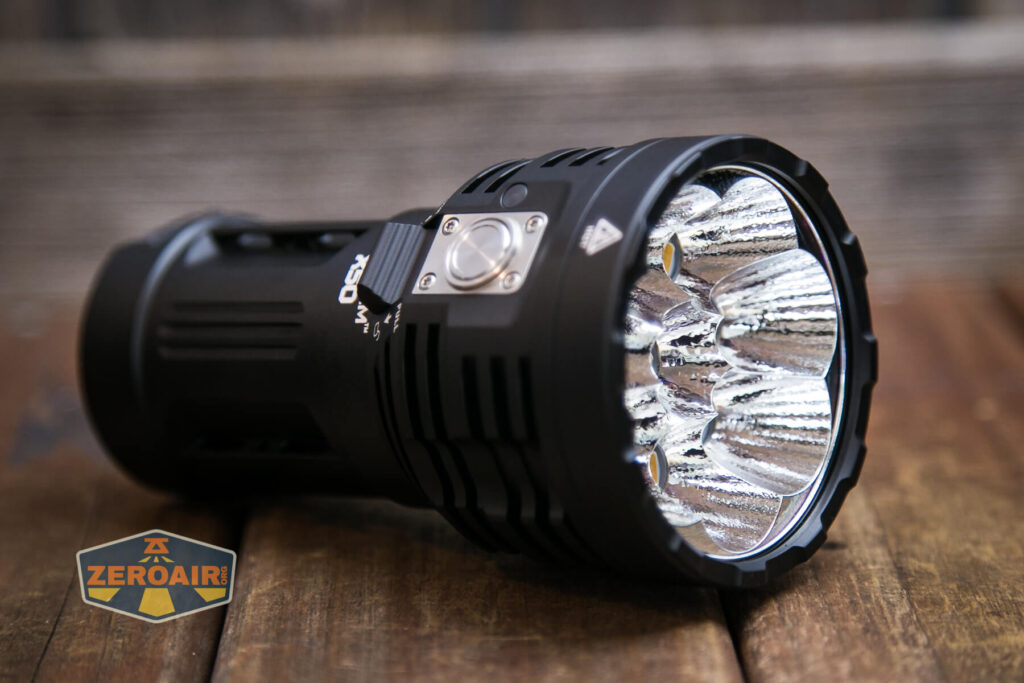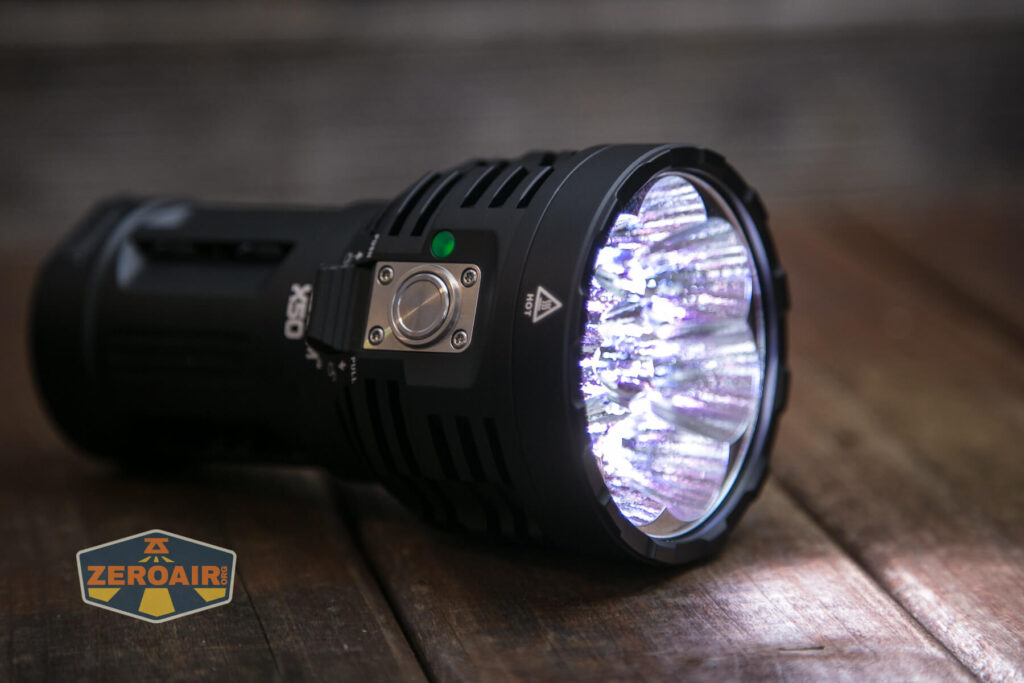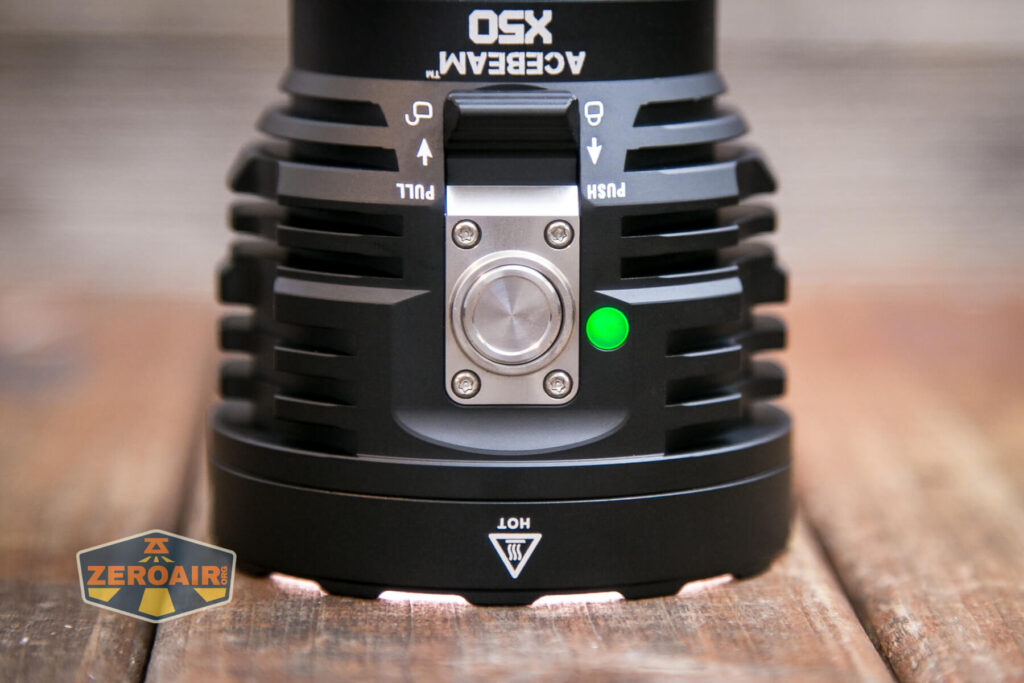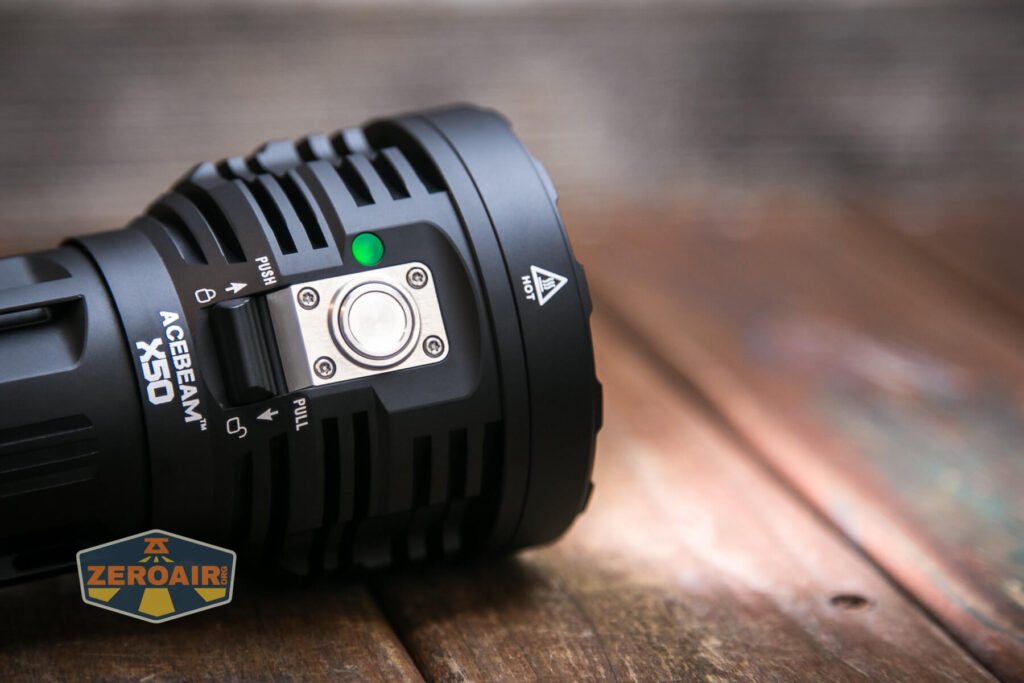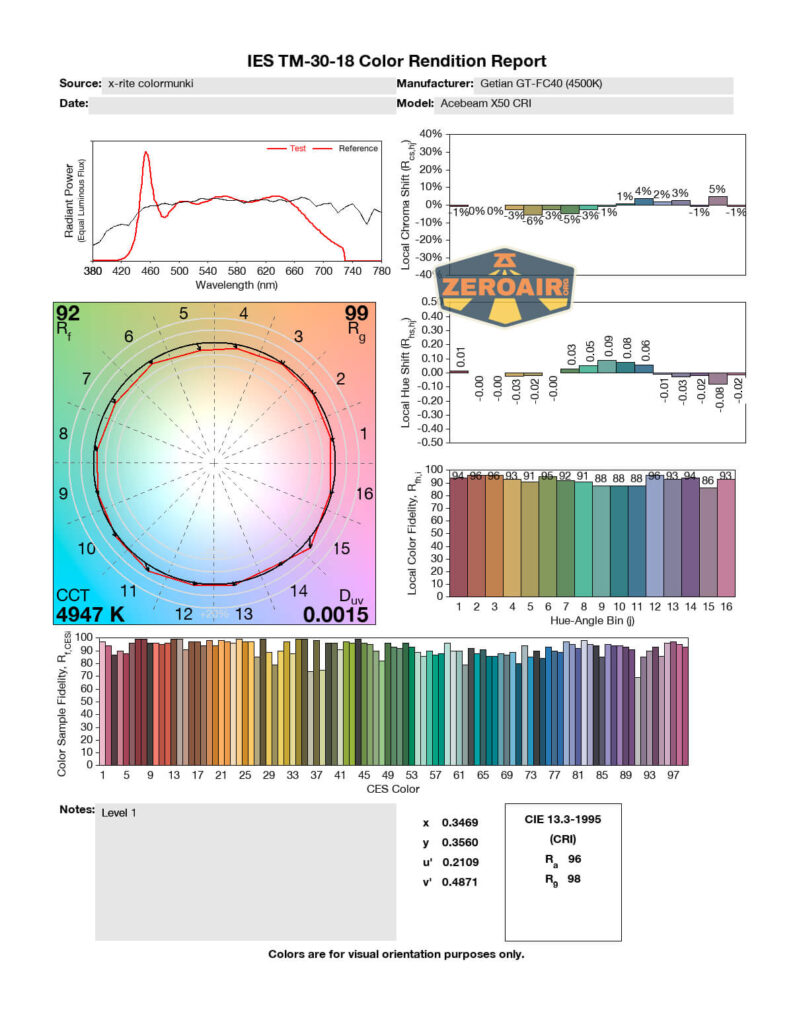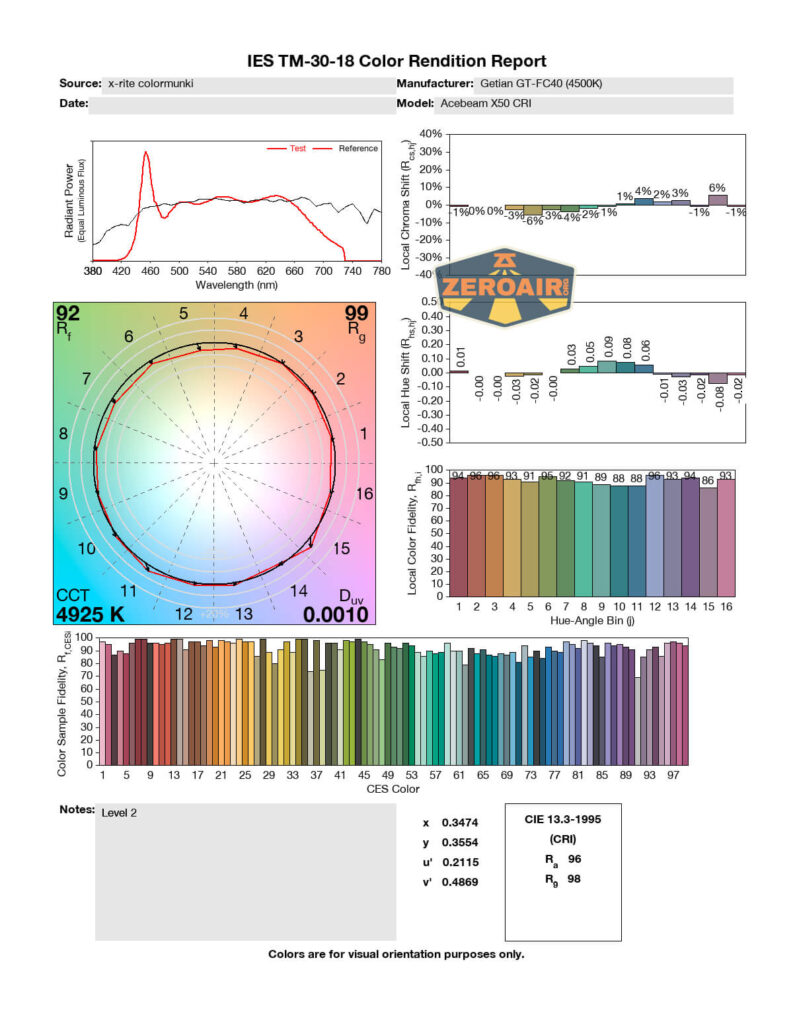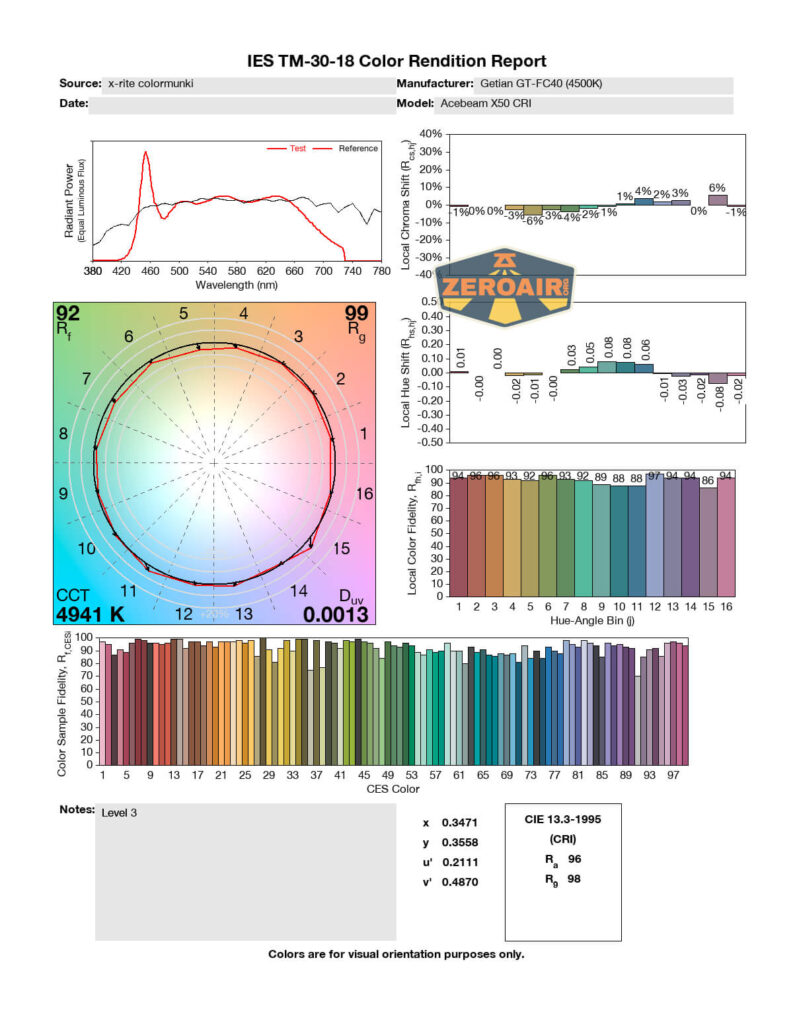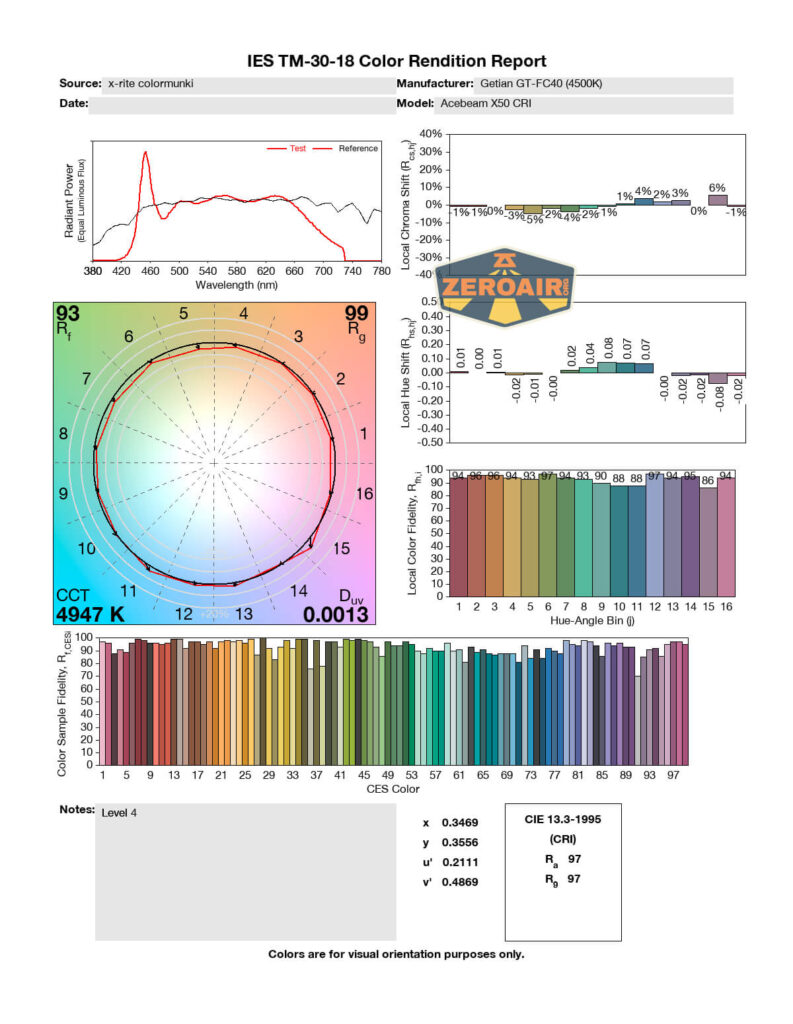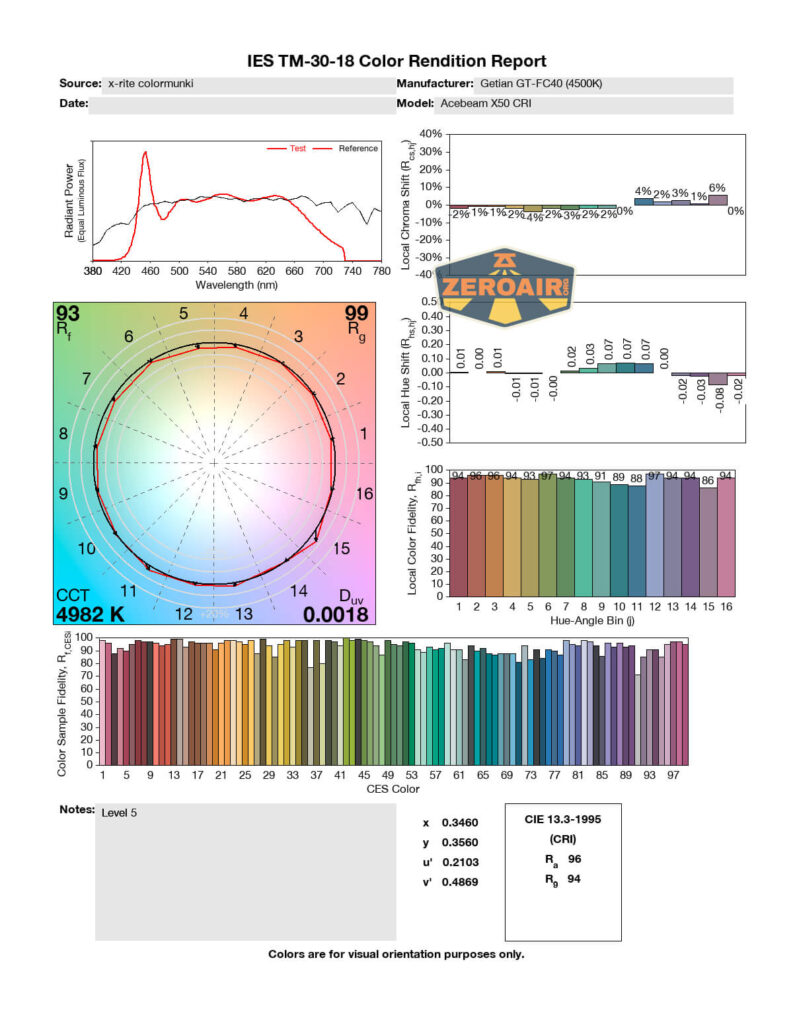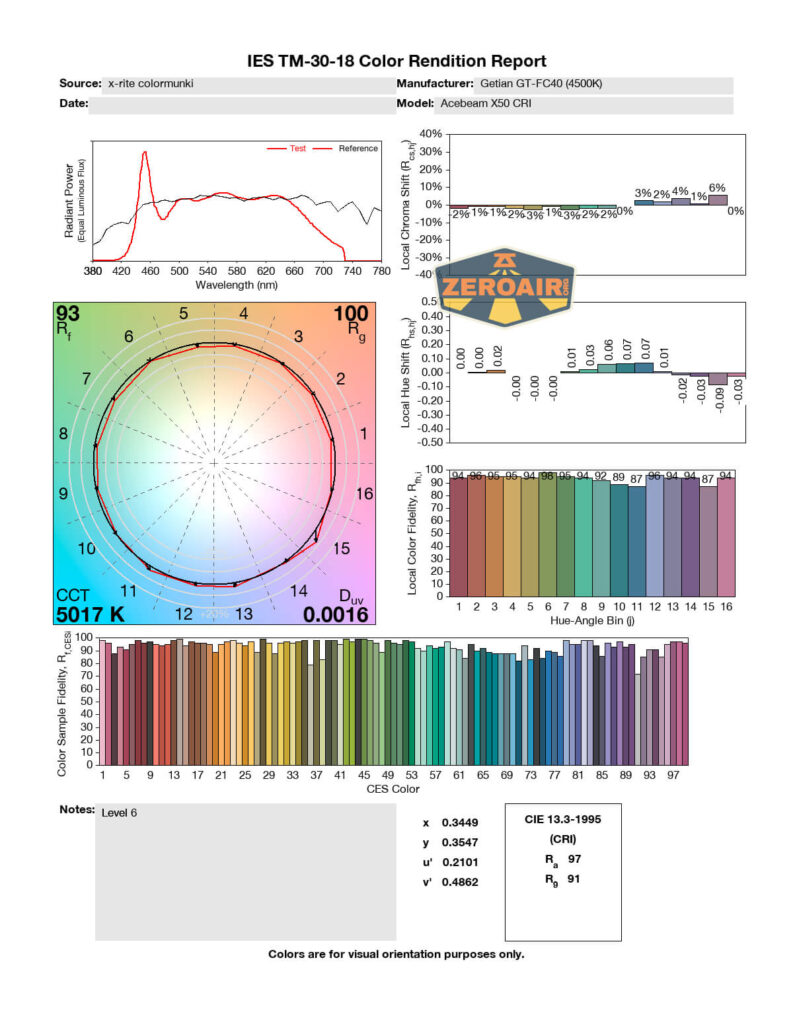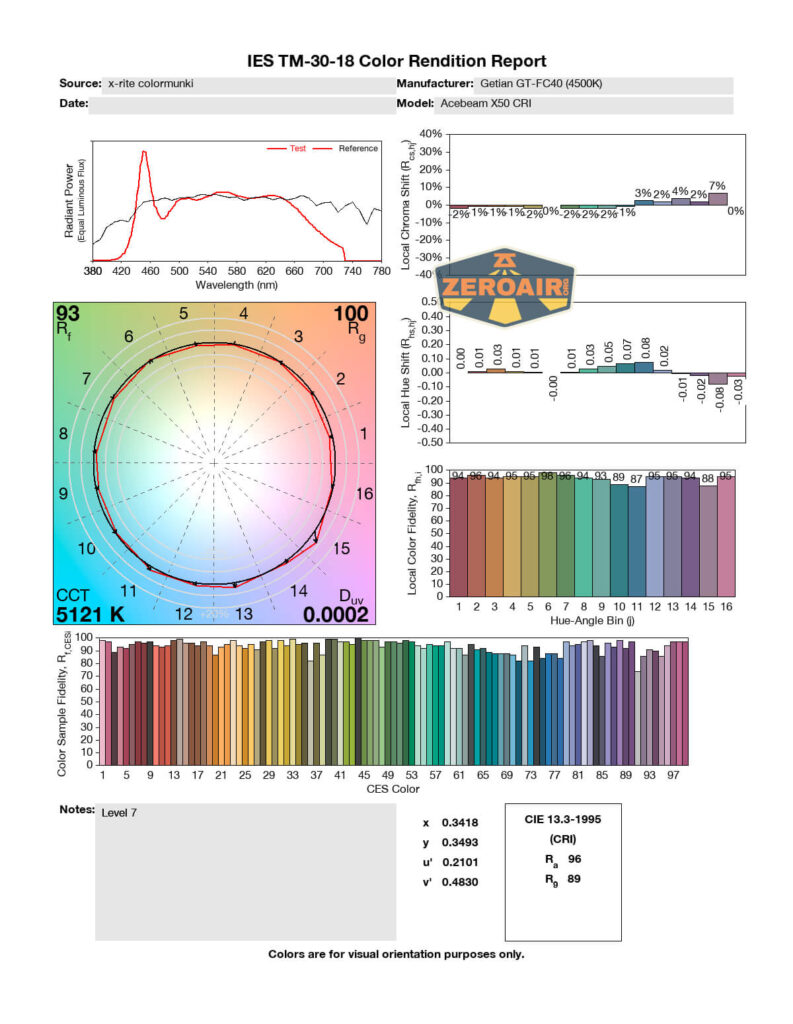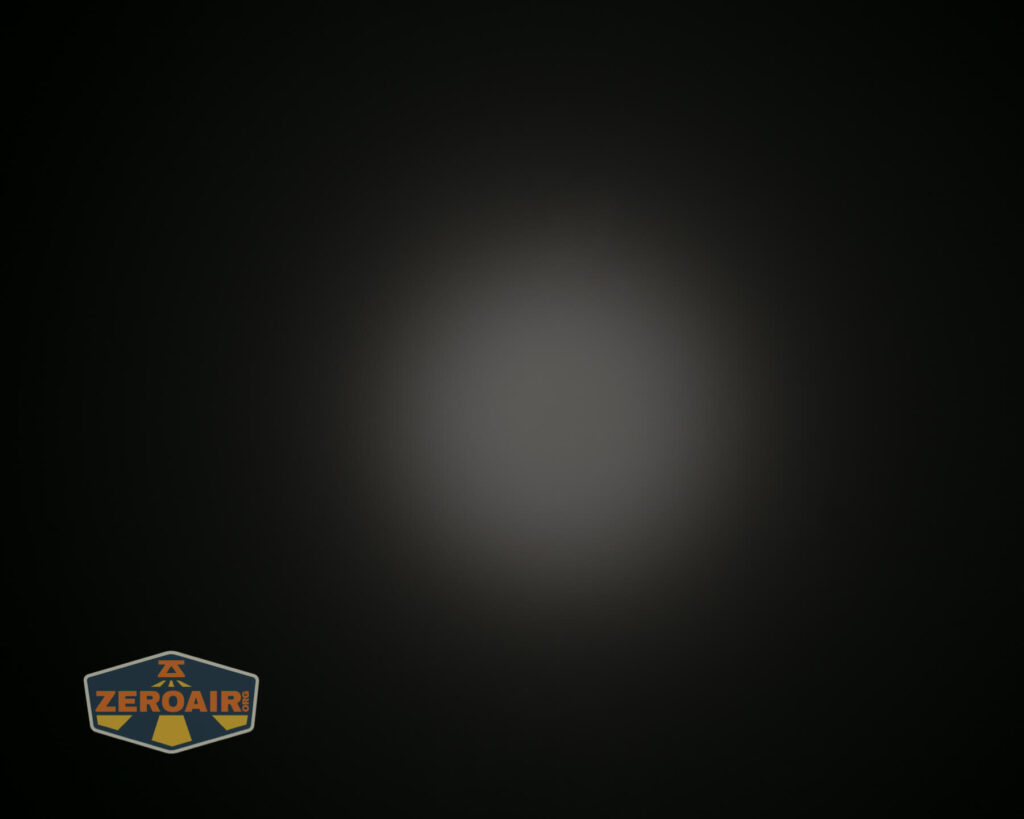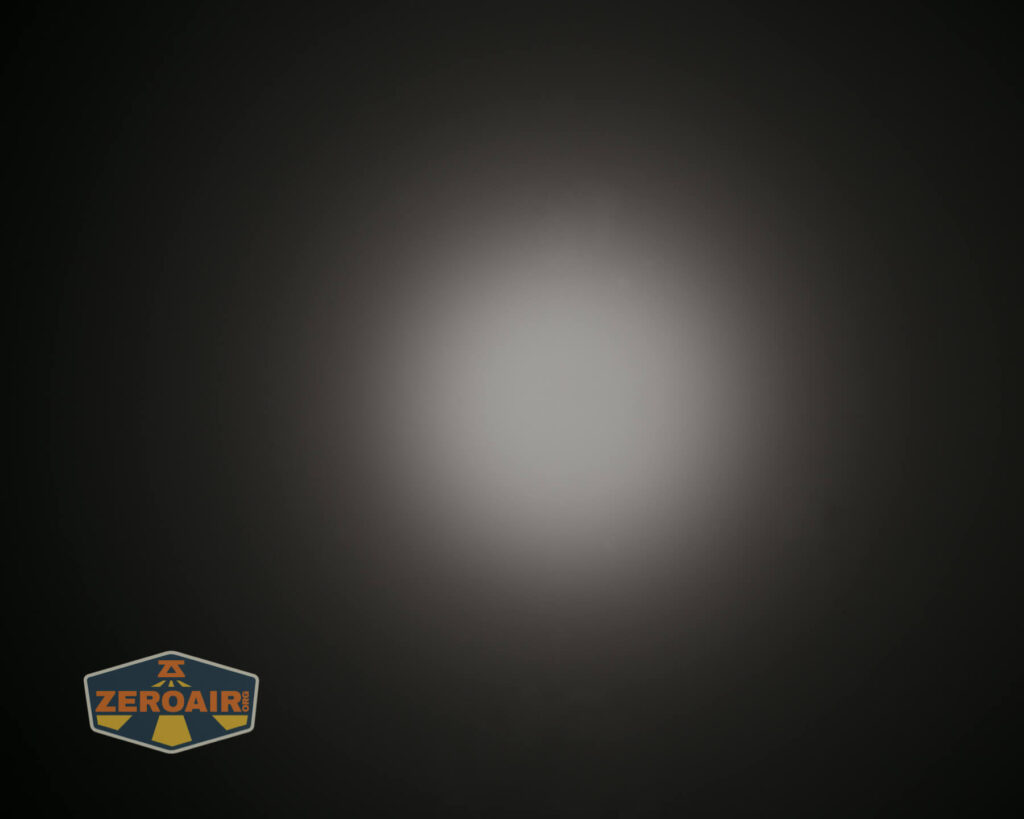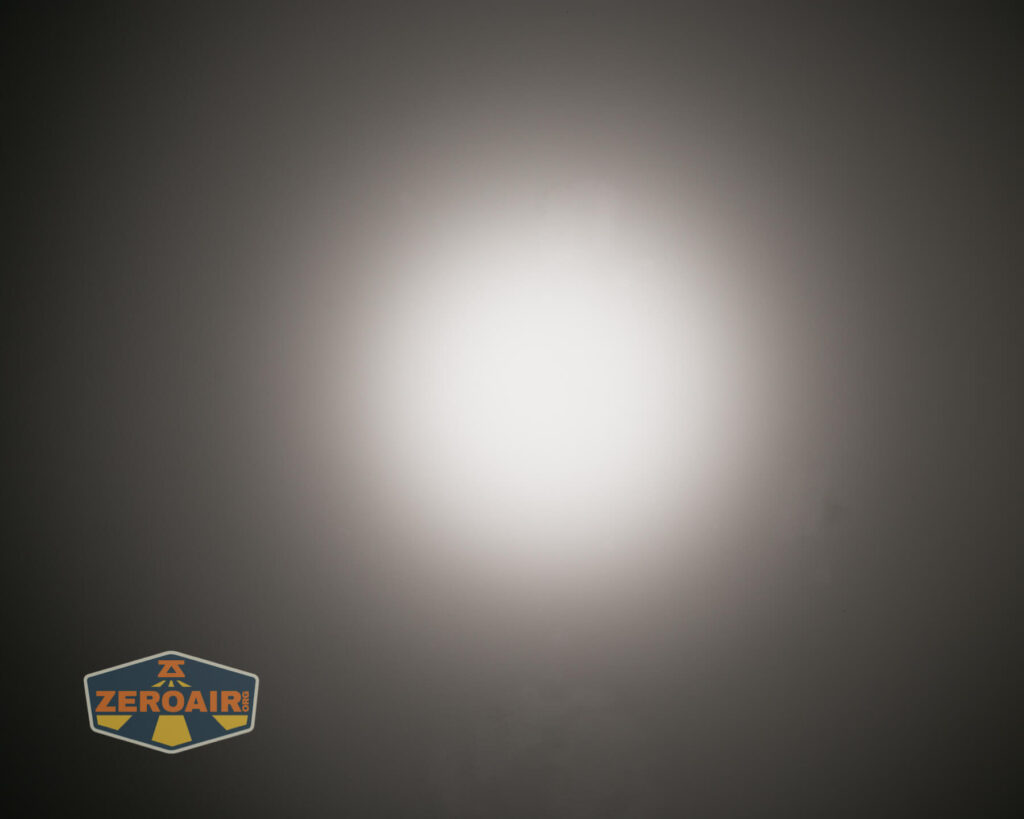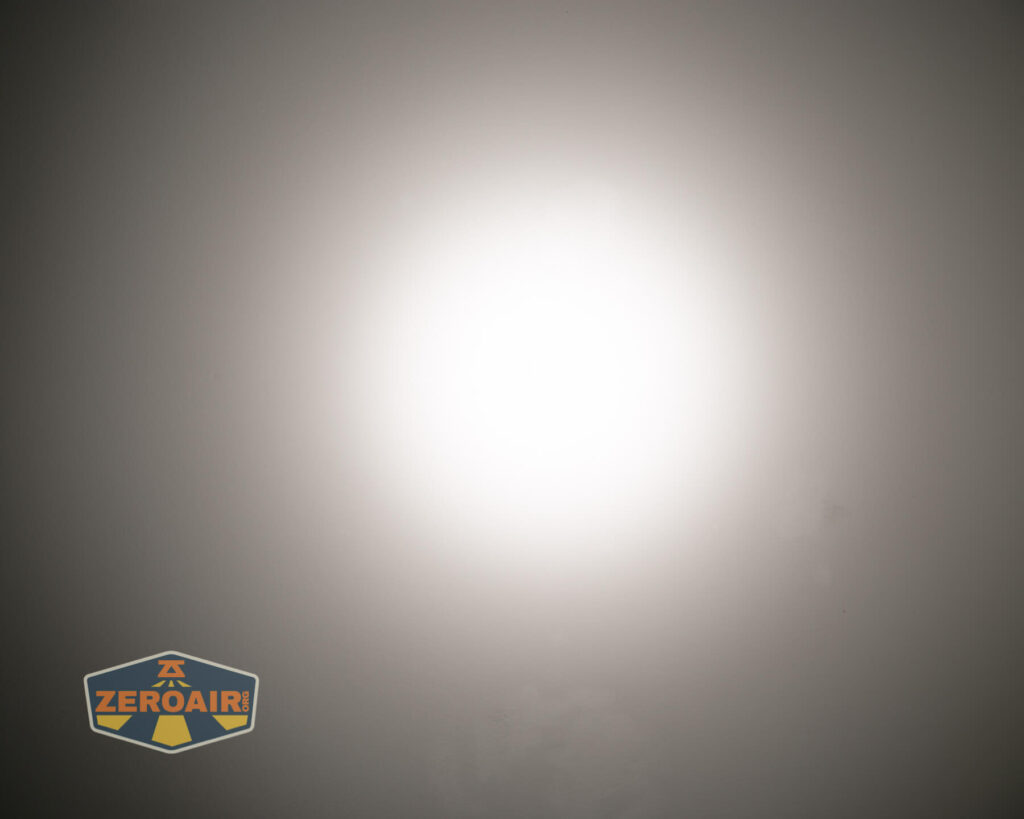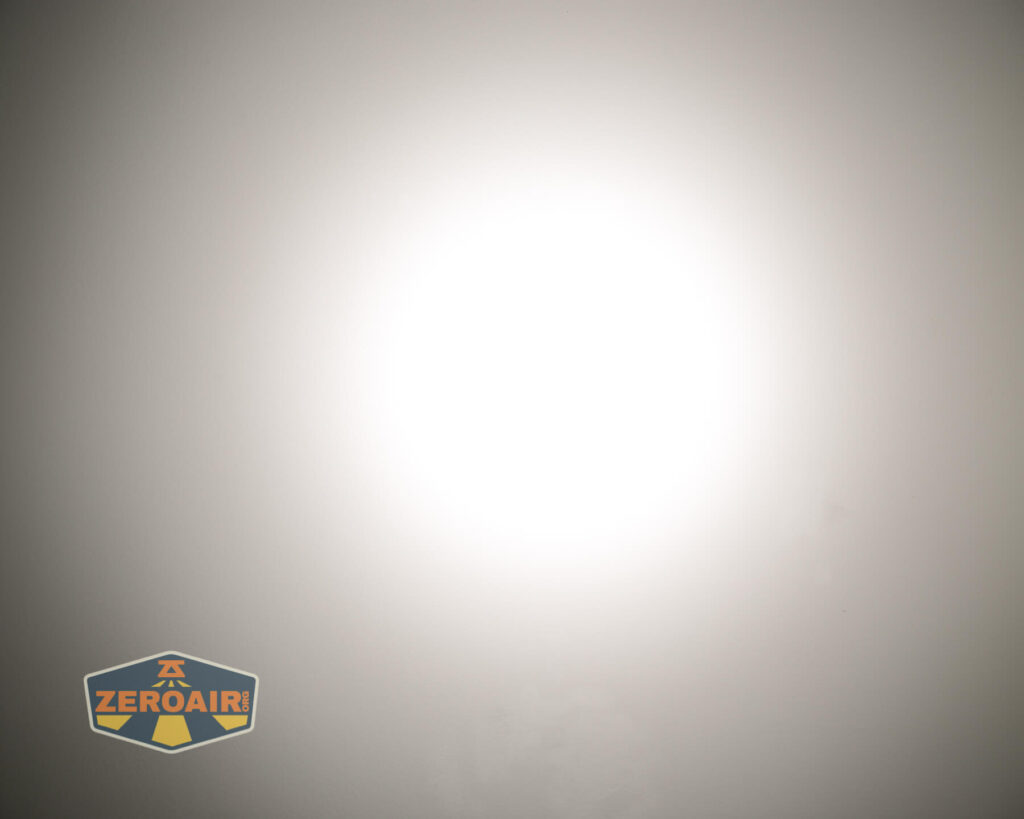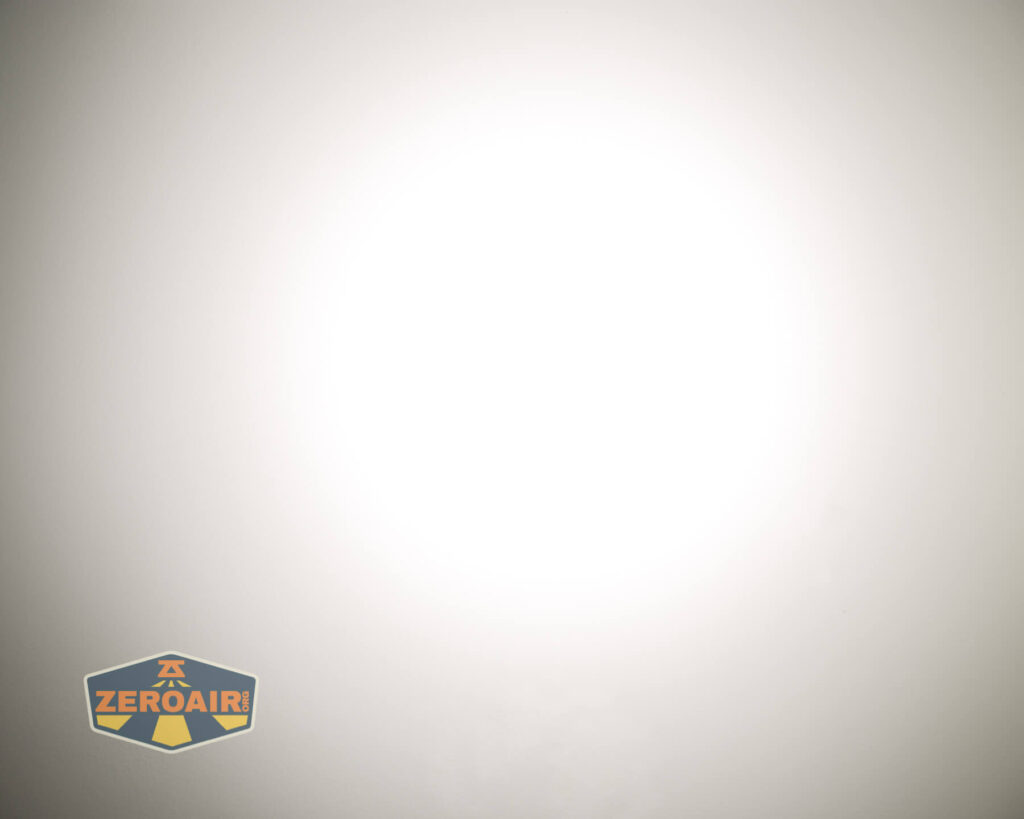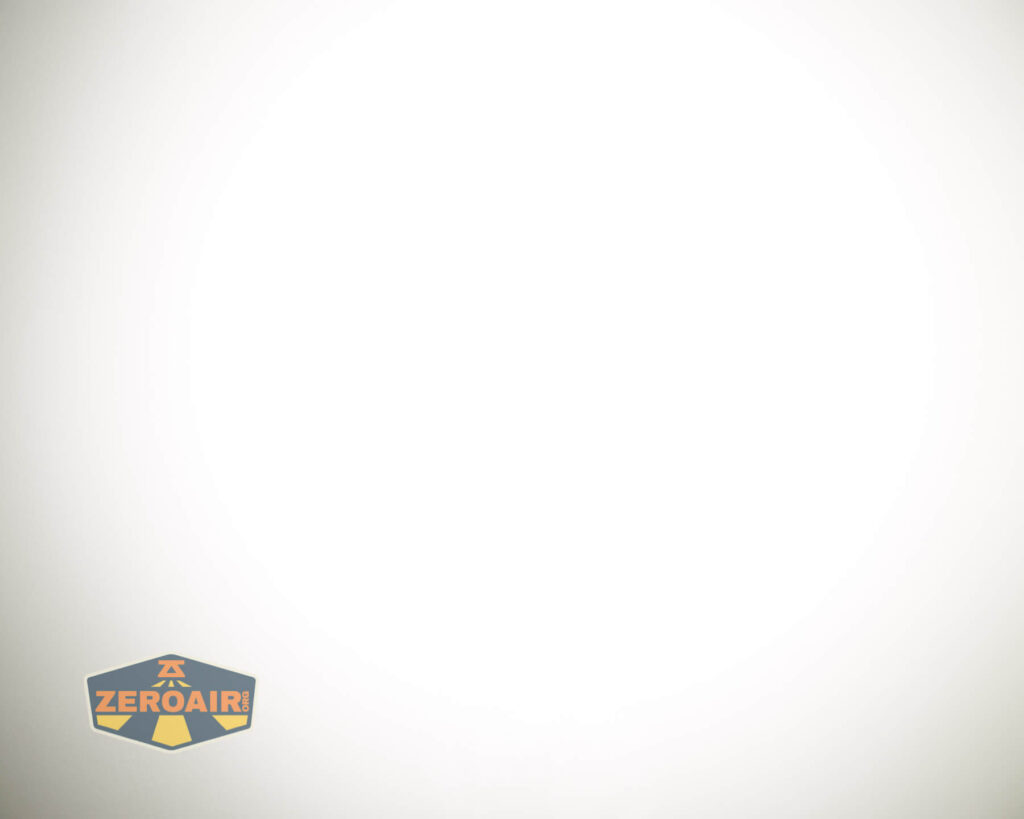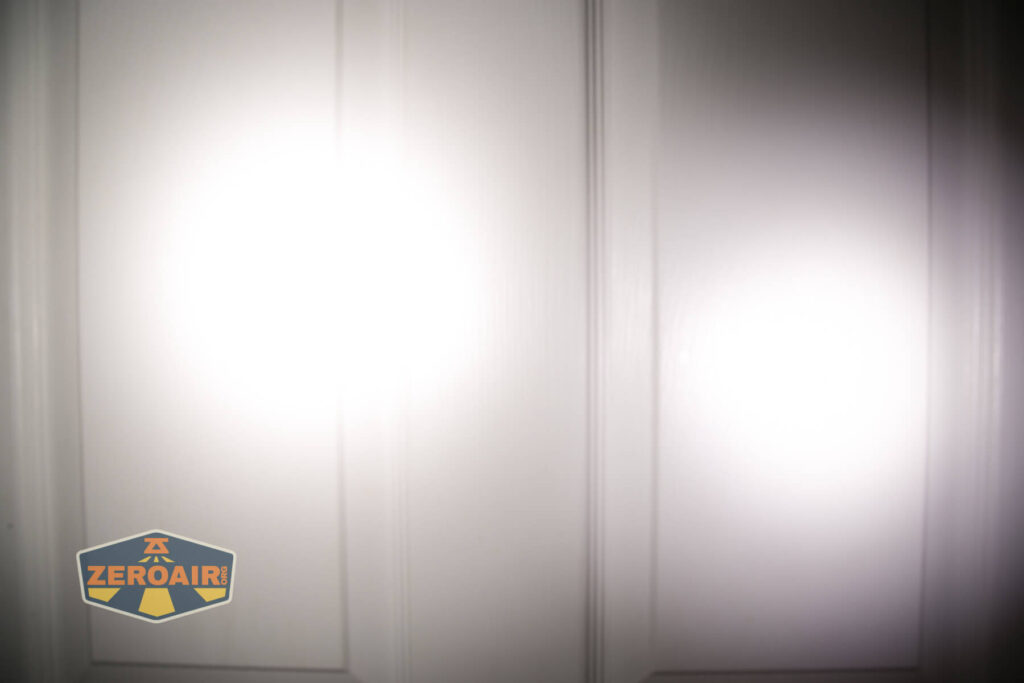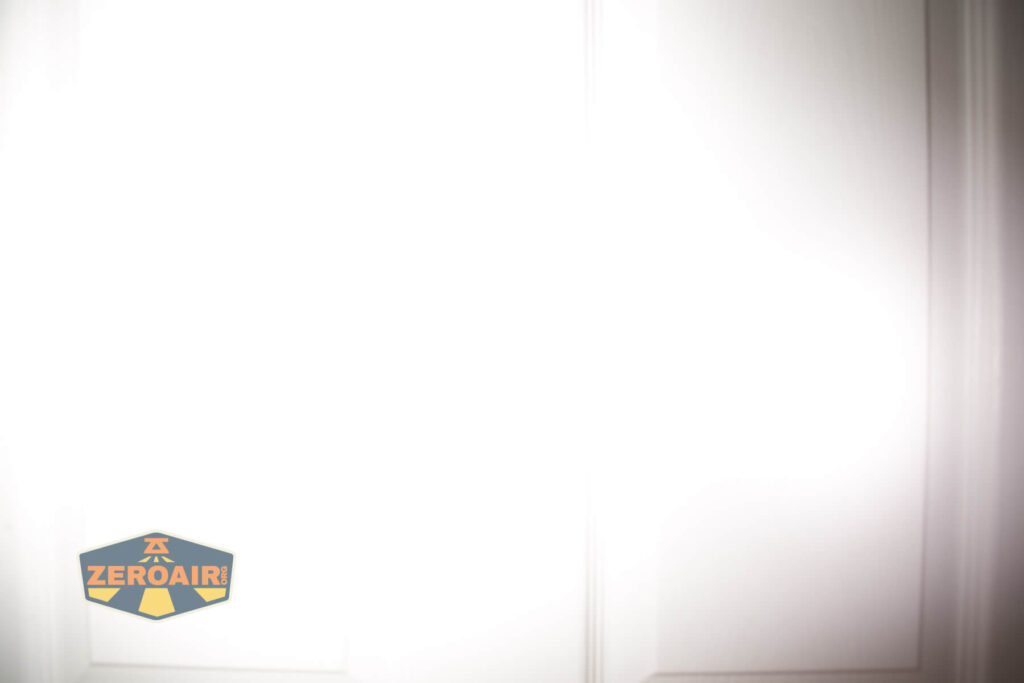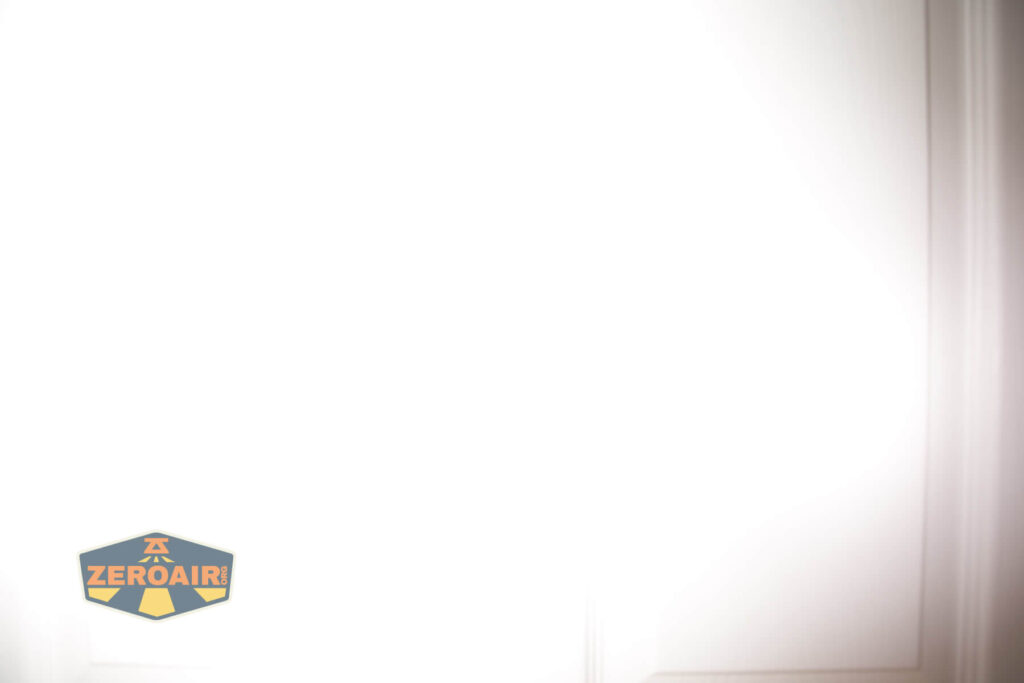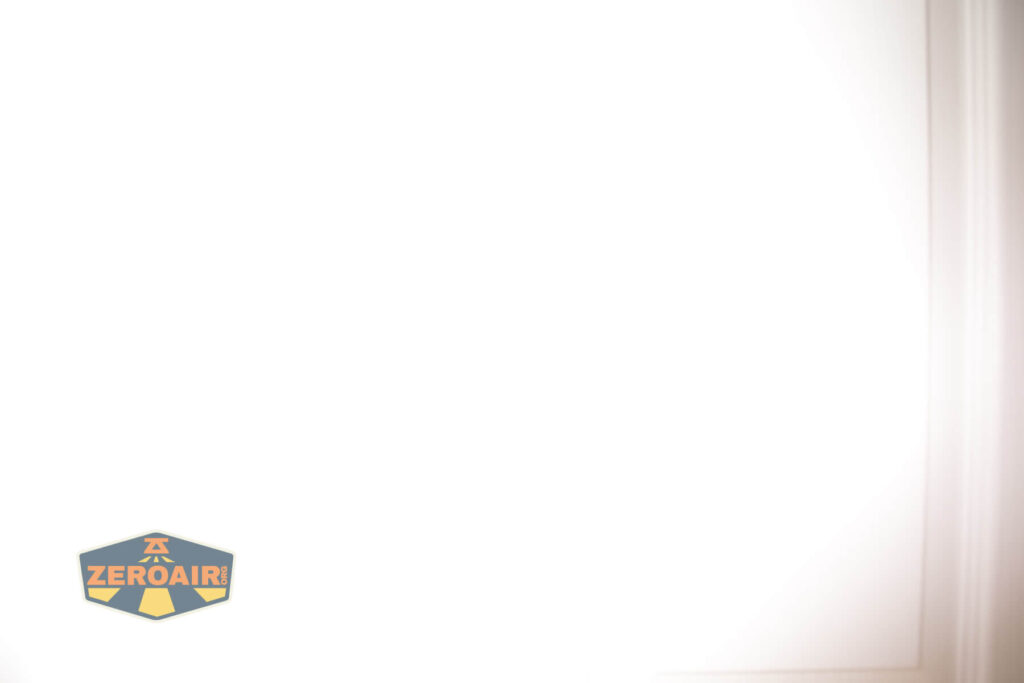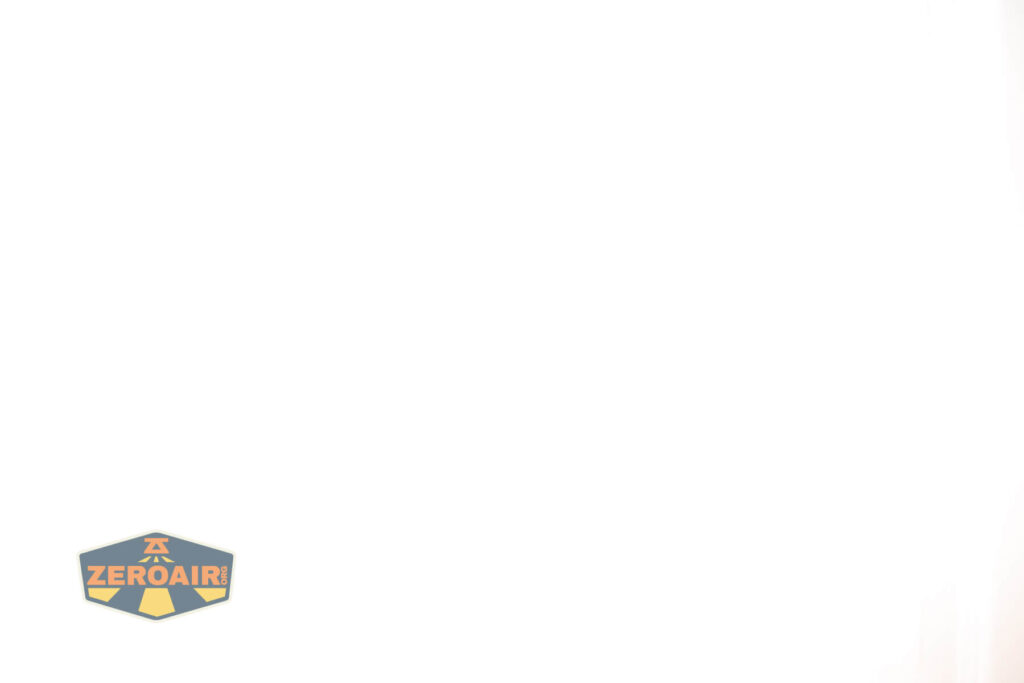Acebeam X50 CRI Flashlight Review
Acebeam X50 CRI flashlight is now available. It’s a high CRI version of the X50 flashlight. I love these high CRI emitters! They’re 4500K, too! Read on!
Official Specs and Features
Here’s a referral link to the Acebeam X50 CRI flashlight product page at killzoneflashlights.com.
Versions
Only one body style is available, but three emitter options exist. The 6500K (Cool White) option churns out more lumens (at around 40,000) and has a better throw (at around 800m). But the 5000K version comes in very close on both counts probably close enough you can’t tell the difference! There’s also this Getian GT-FC40 emitter version that offers high CRI (95) and a warmer output (4500K).
Price
The Acebeam X50 Searchlight comes in at a price of $369. That includes shipping.
Short Review
I had very high expectations for the Acebeam X50 Searchlight. I mean very high. On paper, the Acebeam X50 Searchlight should unseat that. This CRI version, at 4500K and high CRI offers what the 5000K X50 did but is “warmer and better.”
And it has a handle.
I love the X50. That’s why I’ve bought two. 😀
Long Review
The Big Table
| Acebeam X50 CRI Flashlight | |
|---|---|
| Emitter: | Getian GT-FC40 (4500K) |
| Price in USD at publication time: | $369.95 |
| Cell: | Internal |
| Turbo Runtime Graph | High Runtime Graph |
| LVP? | Yes |
| Switch Type: | E-Switch |
| Quiescent Current (mA): | ? |
| On-Board Charging? | Yes |
| Charge Port Type: | USB-C |
| Charge Graph | |
| Power off Charge Port | Yes |
| Claimed Lumens (lm) | 21000 |
| Measured Lumens (at 30s) | 15288 (72.8% of claim)^ |
| Candela per Lumen | 4.9 |
| Claimed Throw (m) | 494 |
| Candela (Calculated) in cd (at 30s) | 2230lux @ 5.799m = 74991cd |
| Throw (Calculated) (m) | 547.7 (110.9% of claim)^ |
| Claimed CCT | 4500K |
| Measured CCT Range (K) | 4900-5100 Kelvin |
| Item provided for review by: | Acebeam |
| All my Acebeam reviews! | |
^ Measurement disclaimer: Testing flashlights is my hobby. I use hobbyist-level equipment for testing, including some I made myself. Try not to get buried in the details of manufacturer specifications versus measurements recorded here; A certain amount of difference (say, 10 or 15%) is perfectly reasonable.
What’s Included
- Acebeam X50 CRI Flashlight
- Acebeam handle (with screw)
- Wall wart with USB-C output
- Long USB-C to USB-C charge cable
- Nylon holster
- Lanyard
- Spare o-rings (2)
- Manual and papers
Package and Manual
Build Quality and Disassembly
It’s going to be hard for me to not gush about this light. Acebeam didn’t “send this light for review” I bought this light because I knew I’d love it. Acebeam makes a high-quality product that usually meets the specifications.
Acebeam did give me a discount on the light (and that’s why it’s not a Fun Fund Friday review.) There’s no real point to me saying that aside from the fact that I went into this testing essentially knowing I’d love the light. But testing is testing, so there’s no skew here.
The Acebeam X50 Searchlight is a robust little light. It’s little, too; it’s really a can-style flashlight. What I typically call a “wall of light” flashlight. It has a very good weight in hand, too and just oozes good build quality.
And the waffles. Oh, those waffles! Check out these GT-FC40 emitters.
There are no springs, but that brass button is springy. This is a bit of an update from the previous iteration I reviewed – there’s no sticker or “conformal coating” to be seen here. That’s neither good nor bad, though.
Despite being a can-light, the head flares a little because of these cooling fins. You can see more below on why that’s needful (spoiler, it has something to do with the 240W being pulled on Turbo).
Along the body is no knurling, but these fins do aid in grip.
Here’s something you’ll really never have to do: disassemble the light.
You can see below on the battery side how there’s a sort of a long neck above the threads. I don’t know what the purpose of that is, but I can say it aids in threading the parts together. It’s like a runway to line things up accurately.
Size and Comps
Officially, the Acebeam X50 Searchlight is 132.5mm x 75mm x 51.5mm, and weighs 690g with the battery included.
If the flashlight will headstand, I’ll show it here (usually the third photo). If the flashlight will tailstand, I’ll show that here, too (usually the fourth photo).
Here’s the test light with the venerable Convoy S2+. Mine is a custom “baked” edition Nichia 219b triple. A very nice 18650 light!
And here’s the light beside my custom-engraved TorchLAB BOSS 35, an 18350 light. I reviewed the aluminum version of that light in both 35 and 70 formats.
Retention and Carry
Let’s first talk about one of the two best features of this flashlight. (I’m not actually thinking of two specific ones, and I think there are more than two best features, but… let’s just go with that).
It’s not just the handle. The handle is fantastic. But that handle attaches on a UNC1/4″ tripod mount. So even if you didn’t want to use the handle, you could use a tripod, and facilitate room lighting or whatever. It’s a nice feature.
The handle also has slots. So, for example, you could run the lanyard here and have a good wrist strap. It’s possible to consider the handle a bit thin, so you might like this extra assurance.
On to the actual handle. You can see above that there’s a little cutout below the 1/4″ screw hole. That’s important because it’s a keyed slot for the handle. When the handle is installed, it fits in exactly one orientation and doesn’t have any side-to-side movement.
At 240W (albeit briefly), you’ll likely want your hand that far away from the light if you’re running Turbo.
I initially fussed that the text on the tailcap you can see below does not line up with the handle or switch or anything. But that turns out to be a great feature. This means that the handle does not interfere with the charge port!
Here’s the downside of a “dumb handle.” Dumb, meaning, of course, no electronics. The switch is on the opposite side from the handle. That’s just the facts, but essentially means two hands will be required for operating the Acebeam X50 Searchlight when also using the handle.
Interestingly, the tripod screw included with the handle is not captured. So be sure to keep up with it. That said, it’s a standard screw, so available for very cheap.
There’s also a lanyard. I attached the lanyard only through these holes in the side of the body, but the handle provides many attachment points as well.
Finally, there’s the nylon pouch. It’s a directional pouch, into which the X50 fits only bezel up.
While the bottom is open and the light can slip in fully, the top is closed. Thus, the light can not be used while in the pouch. The pouch has a velcro closure.
Power and Runtime
Power is provided to the X50 via the included built-in battery pack. This is a 10.8V (nominal) battery pack, providing 4250mAh.
Almost certainly inside this battery pack are three 21700 cells in series. However, they’re built in.
Spare battery packs are available, but at $129, it’s a hard purchase. It’s unclear whether the spare battery pack is a complete tail section of the light (likely) or if you’ll have to remove those three screws seen below and swap in the battery pack into your tail section.
Companies usually get a ton of grief for built-in battery packs. And sure, I wouldn’t mind being able to swap in my own three 21700 cells. However, with these cells in series, it’s … more dangerous … for users to use their own cells. Unmarried-cells-in-series are when problems happen, and one way to alleviate that issue is to just build them into the light.
Here are some runtime tests. I wanted to test until at least the mode where there was no stepdown, and you can see that below. Med2 is that mode, which holds steady at around 2000 lumens for nearly two hours.
There is a low voltage warning through the indicator beside the switch. It indicates as follows:
Green steady: 100-30%
Red steady: 30-10%
Red flashing: <10%
I observed the above; it’s quite noticeable (and useful). As you can see from all these runtime graphs, the light also steps down a few times and does finally shut off. After every test, the battery pack was either 0V or some very low (ie negligible) reading. I am sure (but unable to test) that the cells are not “0V,” but the battery (as a whole) has a protection circuit that trips to prevent over-discharge.
Charging
Having the built-in battery is not so bad, because of the built-in charging via USB-C.
This charging port is on the bottom (or tailcap) of the Acebeam X50 Searchlight and has a nice press-in cover. The cover is thick and quite secure. Interestingly (and intentionally, I’m sure), the charge port covers the charge indicator light (which you can see to the right of the charge port below.) Note that this is not the same indicator that’s used to tell the charge level during light output.
Here’s the included wall wart. The output of 20V is used for charging the Acebeam X50 Searchlight. That’s a nice high charge voltage, and it also uses a nice high charge current. Charging is, in fact, quick!
This included USB-C to USB-C charge cable is longer than most I’ve seen (probably a full meter?) and also very thick. Unusually thick. T H I C C thick. Very good for those high currents!
Charging progresses nicely at a remarkable 3A or so, and finishes in a blistering 90 minutes! Again, that’s charging at 20V, so… capacity measurement at the right of the graph doesn’t account for that.
Powerbank
The USB-C output is covered in the manual to serve as a powerbank too. I tested with a number of USB-C items and just simply did not have any devices (or testers) that could work with the powerbank feature.
Finally, I plugged in this little laptop I tested a long while back, and while I am unable to log with this setup, I can confirm that the Acebeam X50 Searchlight does work as a powerbank on some devices. The manual covers this actually, by saying something about protocols not matching, and in those cases charging won’t work.
In fact, not only does USB-C output work, but this laptop was able to negotiate 5V and 12V output from the Acebeam X50 Searchlight. So while I was unable to log it, please take comfort in knowing that it does work!
Modes and Currents
| Mode | Mode Claimed Output (lm) | Claimed Runtime | Measured Lumens | Tailcap Amps @~12.6V |
|---|---|---|---|---|
| Turbo | 21000-2800 | 1m-74m | 15288 | >18.1A |
| High | 8500-2800 | 2m-80m | 6772 | 6.85 |
| Med3 | 4500-2800 | 9m-75m | 3634 | 3.37 |
| Med2 | 2200-1200 | 120m-5m | 1849 | 1.69 |
| Med1 | 1200-350 | 4.5m-5m | 933 | 0.92 |
| Low | 350-150 | 17h-10m | 266 | 0.43 |
| Ultra-Low | 150 | 12h | 105 | 0.30 |
Pulse Width Modulation
No PWM on any mode! Another thing to love about Acebeam flashlights!
Here you can see a “baseline” – a chart with almost no light hitting the sensor.
Then there’s the Ultrafire WF-602C flashlight, which has some of the worst PWM I’ve seen. It’s so bad that I used a post about it to explain PWM! Here are multiple timescales (10ms, 5ms, 2ms, 1ms, 0.5ms, 0.2ms) to make comparing this “worst” PWM light to the test light easier. That post also explains why I didn’t test the WF-602C at the usual 50us scale.
User Interface and Operation
There’s just one switch on the Acebeam X50 Searchlight. Long-time readers will expect me to love it because it has an actual metal cover, and I do. It’s a great switch.
The action is very low, and there’s not much of a positive click.
Another extremely important aspect of operation for the Acebeam X50 Searchlight is this second switch. It’s possible to physically lock out the X50 using that physical toggle switch seen below (just above the logo.) In the “up” position, the e-switch can not be pressed. It’s physically blocked. I would guess that this physical block on the e-switch does not affect any quiescent current that might be present in the system, so if you want a lockout that breaks the electrical connection, you’ll want to loosen the body ever so slightly, too.
Here’s a user interface table!
| State | Action | Result |
|---|---|---|
| Off | Click | On (Mode Memory) |
| On | Click | Off |
| Off | Hold | Ultra-Low |
| Any | Double Click | Turbo |
| On | Hold | Mode Advance (Low>Med1>Med2>Med3>High) |
| Any | Triple-click | Strobe |
The user interface is very simple.
LED and Beam
There are eight emitters on this beast of a light. They are Getian GT-FC40 emitters in a claimed 4500K. They’re also (very) high CRI, at around 95.
I love these emitters. I like looking at them (tiny waffles!) and I like using them.
Each emitter has a nice little reflector. So while there is a massive amount of output from this light, it also reaches out there quite well.
This version should be (and is!) a good bit more throwy than the other version I already tested. That’s a Cree XHP70.2 version of the Acebeam X50, and I reviewed it too.
LED Color Report (CRI and CCT)
A bit surprisingly, these measure a little cooler than the 4500K claim. I measure them at 4900K to 5100K, but very consistent across the modes. They do hit their spec for CRI, so that’s a positive.
Beamshots
These beamshots always have the following settings: f8, ISO100, 0.3s shutter, and manual 5000K exposure. These photos are taken at floor level, and the beam hits the ceiling around 9 feet away.
Tint vs BLF-348 (KillzoneFlashlights.com 219b version) (affiliate link)
I keep the test flashlight on the left and the BLF-348 reference flashlight on the right.
I compare everything to the KillzoneFlashlights.com 219b BLF-348 because it’s inexpensive and has the best tint!
Conclusion
What I like about the Acebeam X50 Searchlight
- Getian GT-FC40 emitters are absolutely fantastic
- These domeless emitters have better throw per lumen than the other X50 options
- Has an awesome handle
- Great build quality
- Super quick charging in 90 minutes with the 20V ~3A charge rate
- Incredible output
- USB-C charging
- Powerbank
- Great charge indicator
What I don’t like about the Acebeam X50 Searchlight
- Switch is inaccessible from the thumb of the hand that’s holding the handle
- Ultra-Low of 150lumens is… not quite “ultra-low.”
- The battery pack does not allow users to swap cells
- Replacement battery pack is expensive
Notes
- This content originally appeared at zeroair.org. Please visit there for the best experience!
- Please use my Amazon.com referral link to help support zeroair.org!
- Please support me on Patreon! I deeply appreciate your support!



